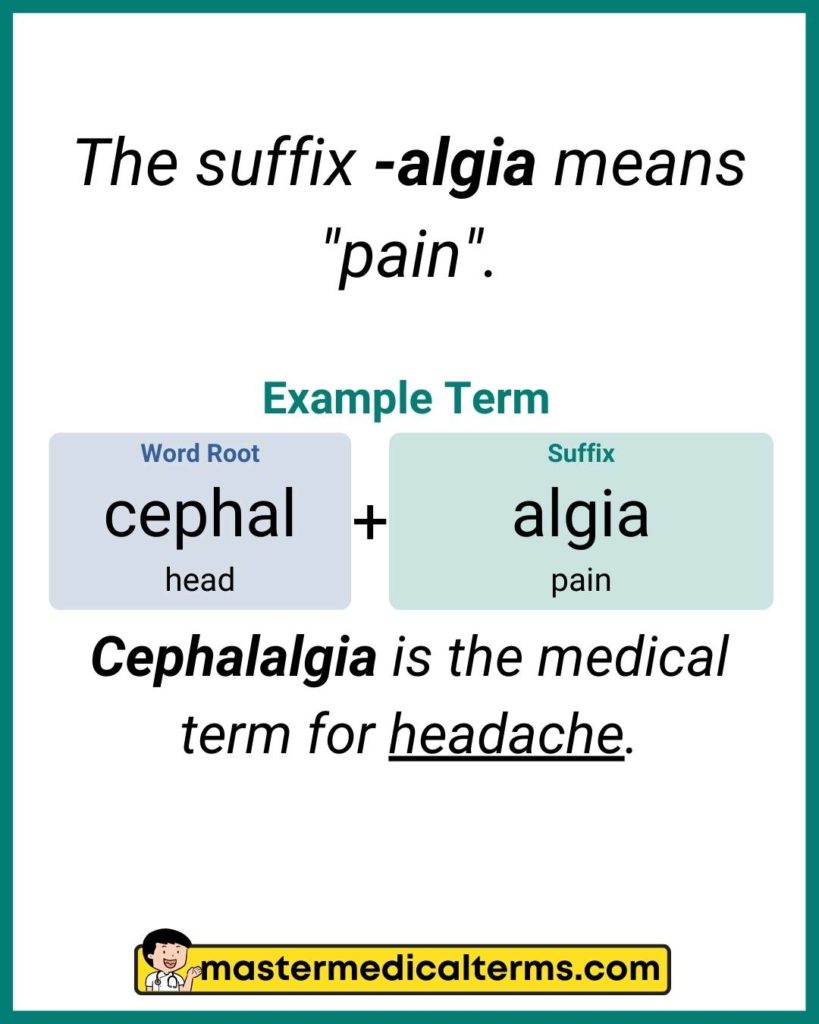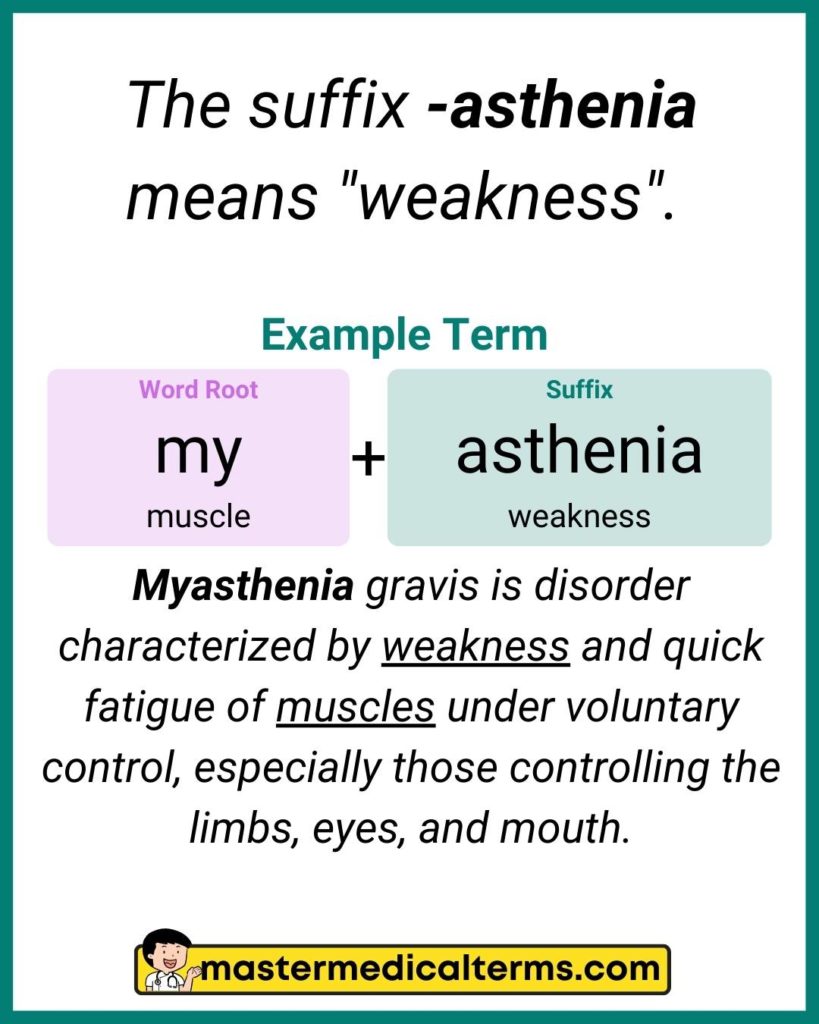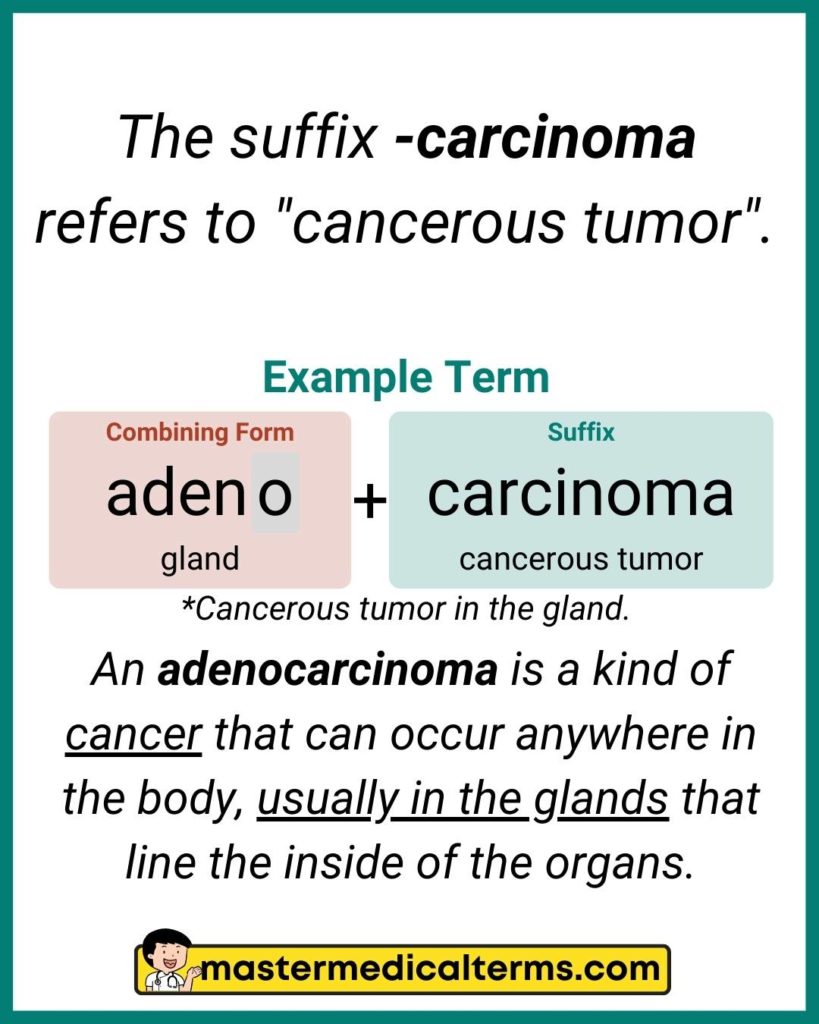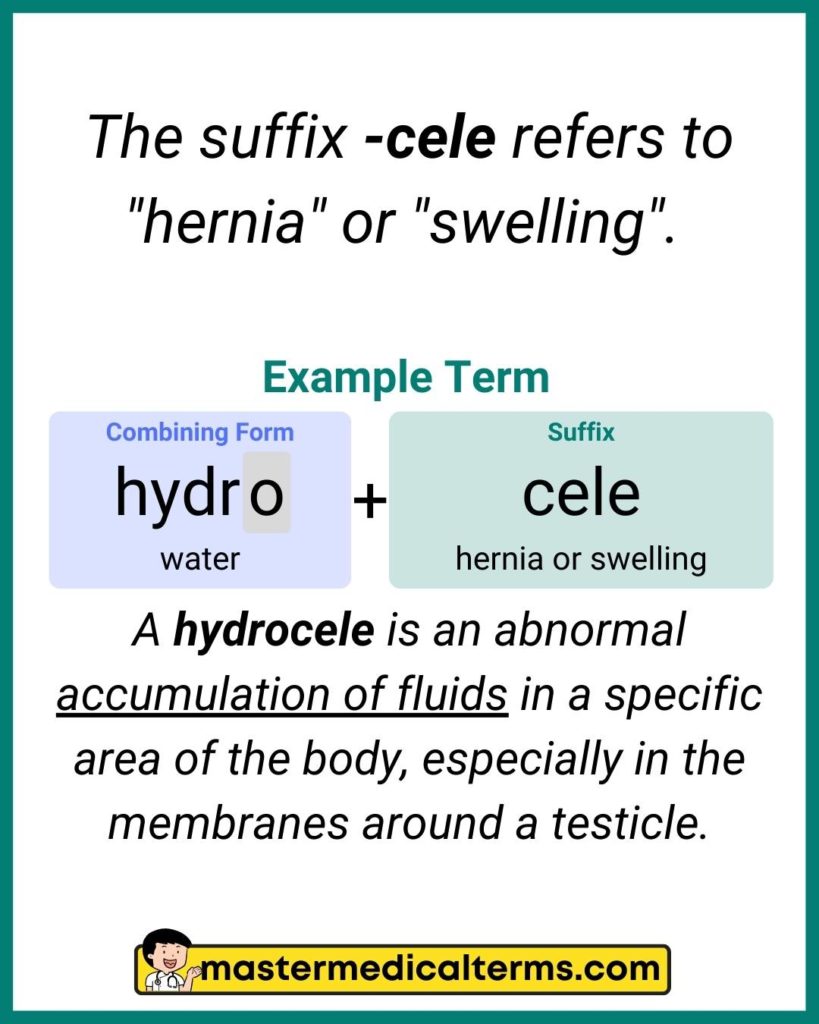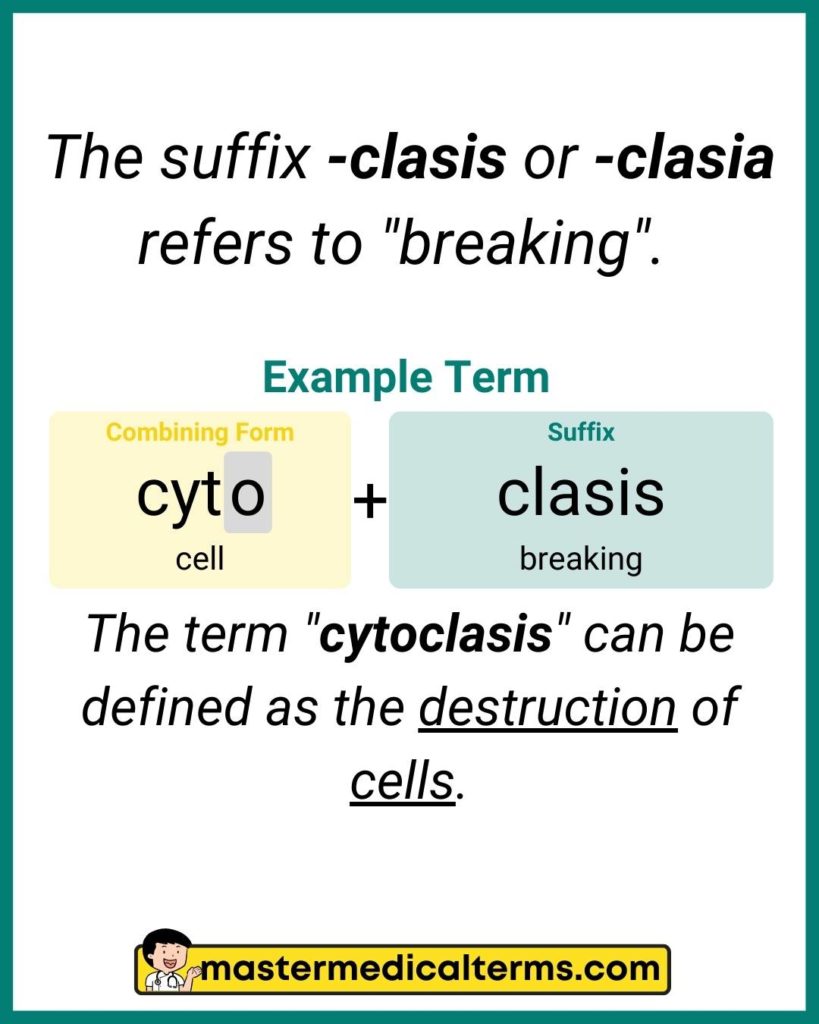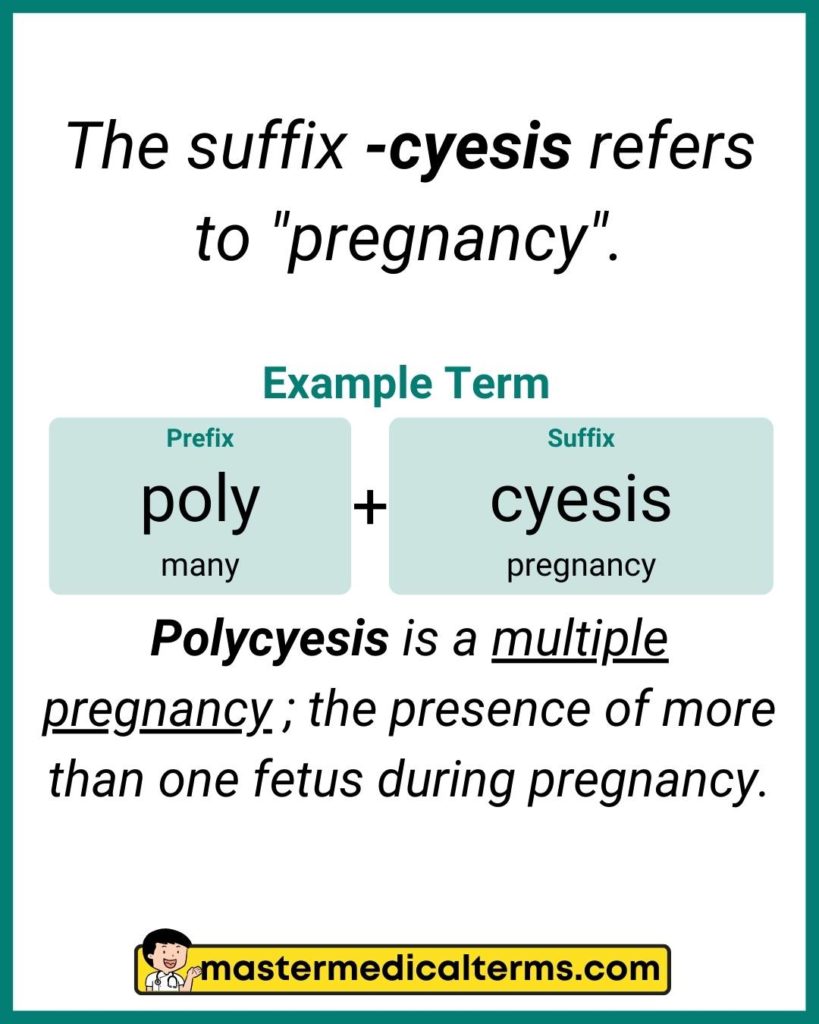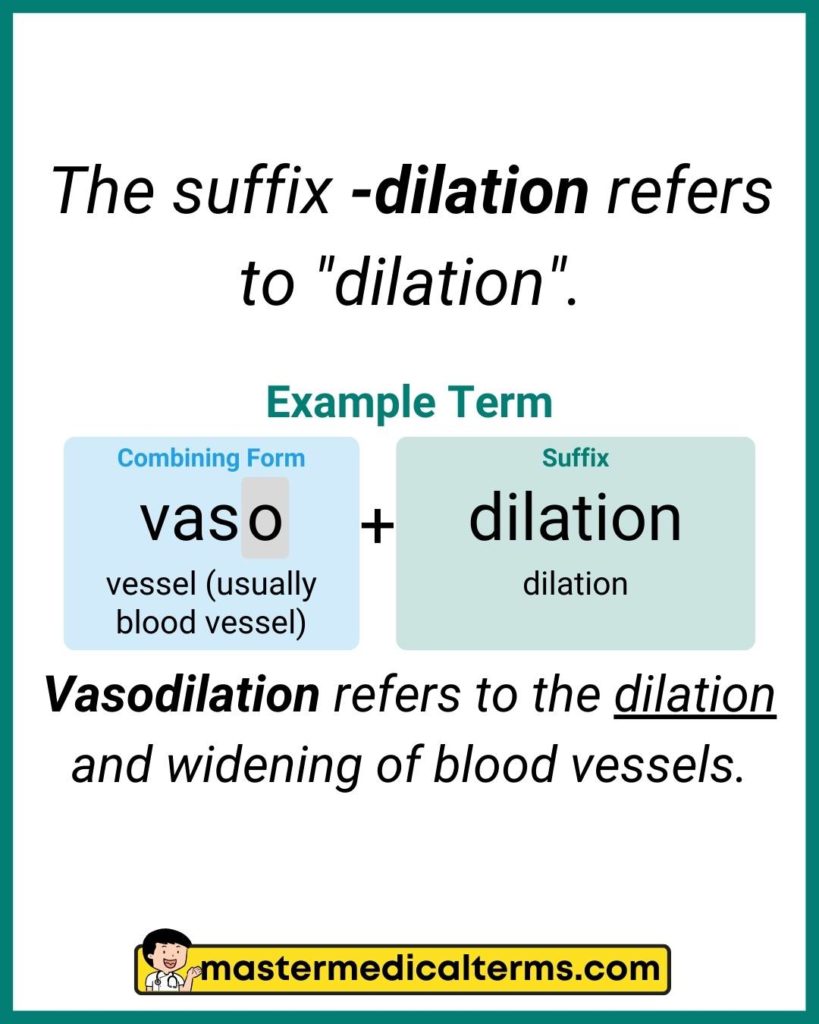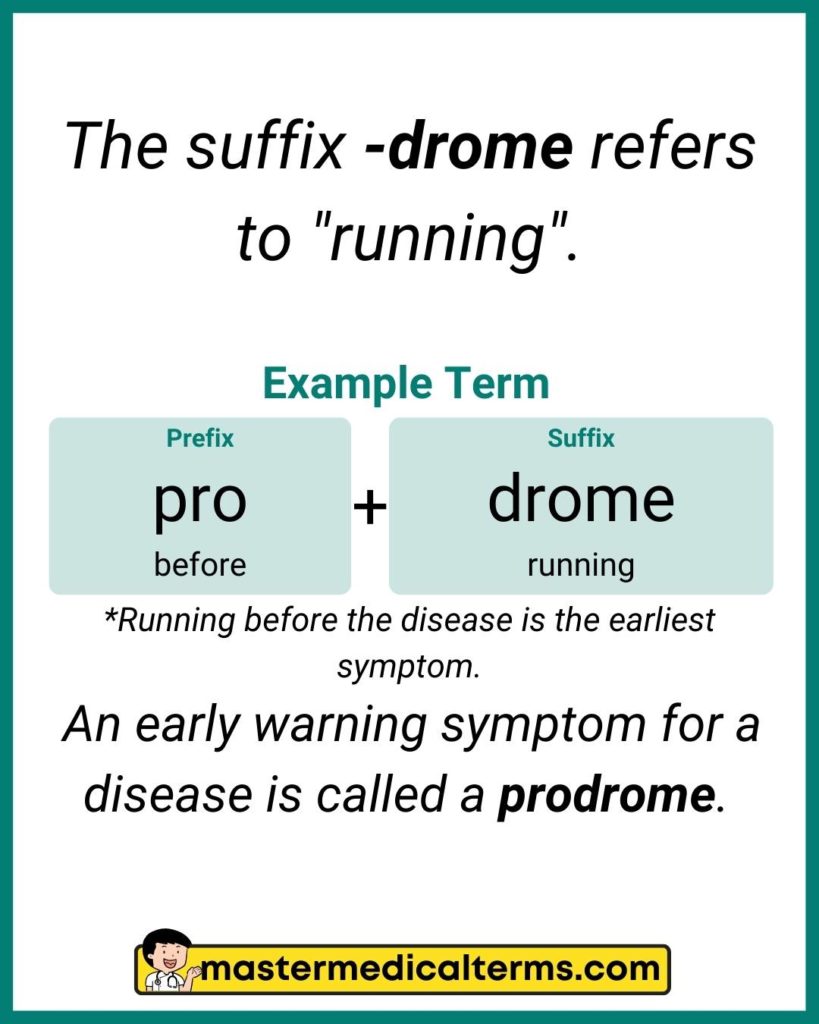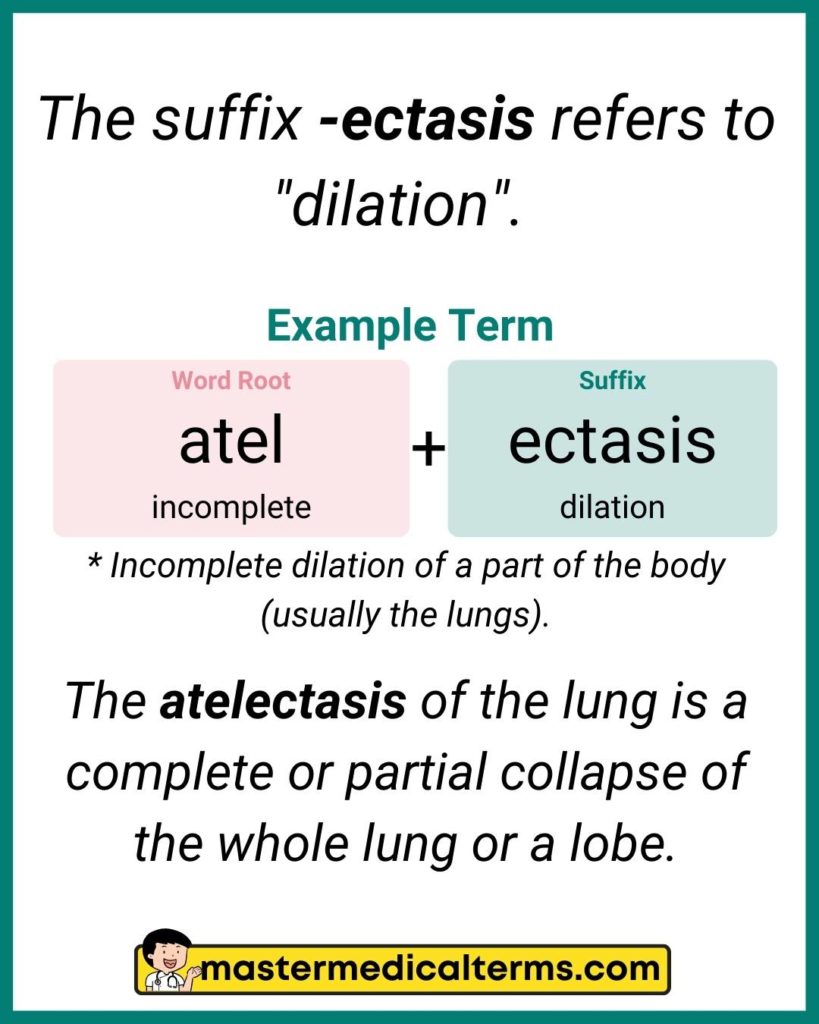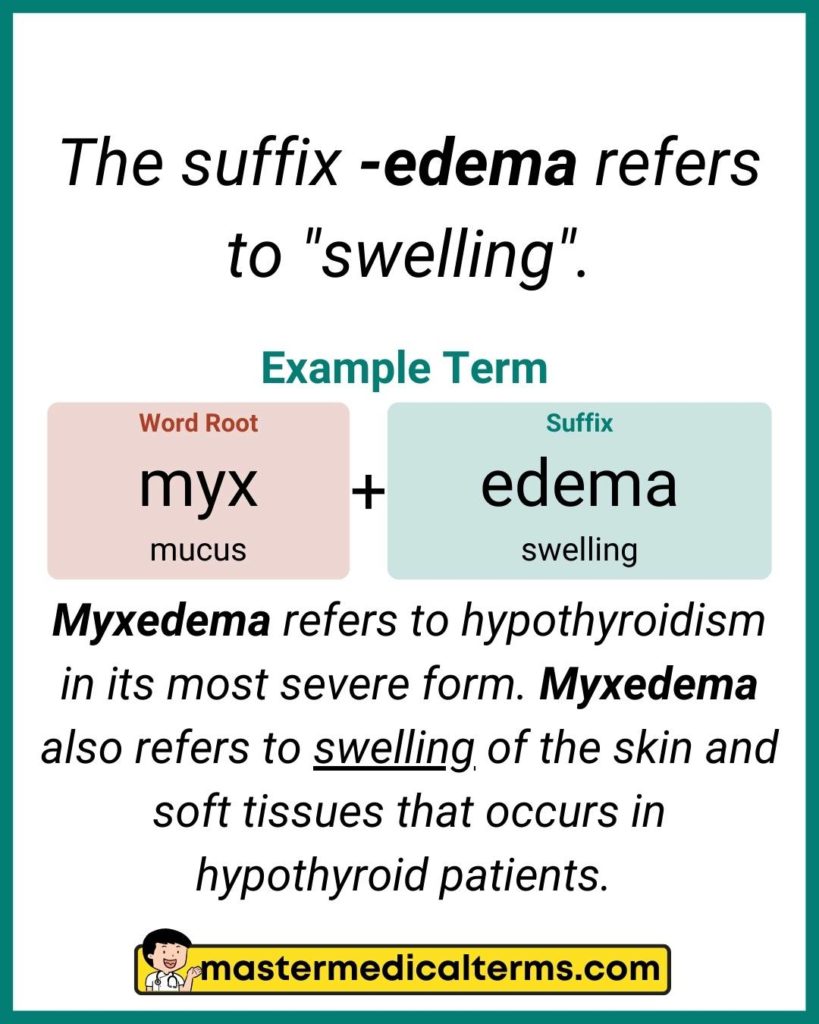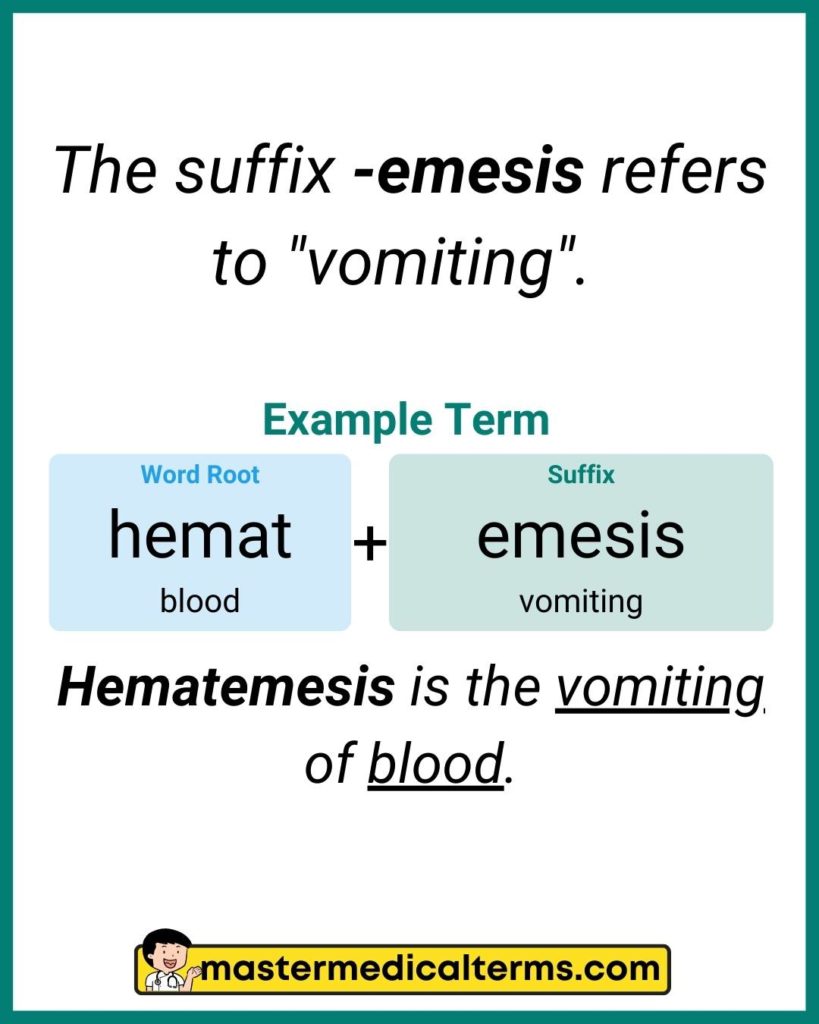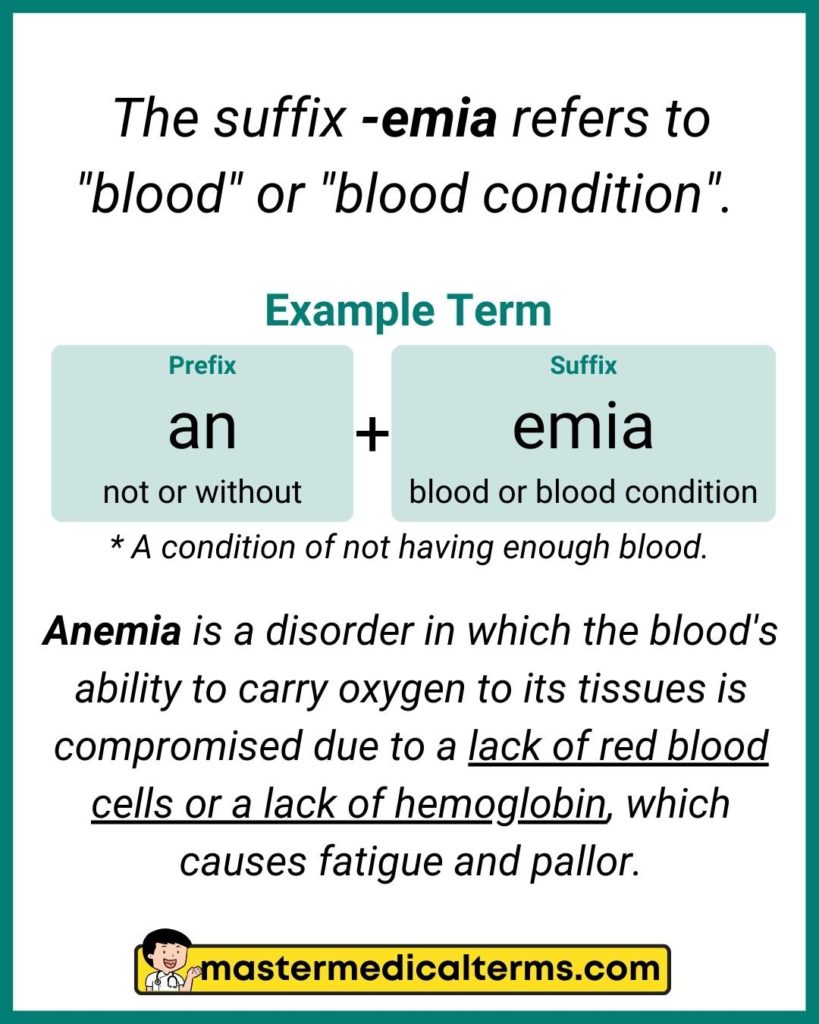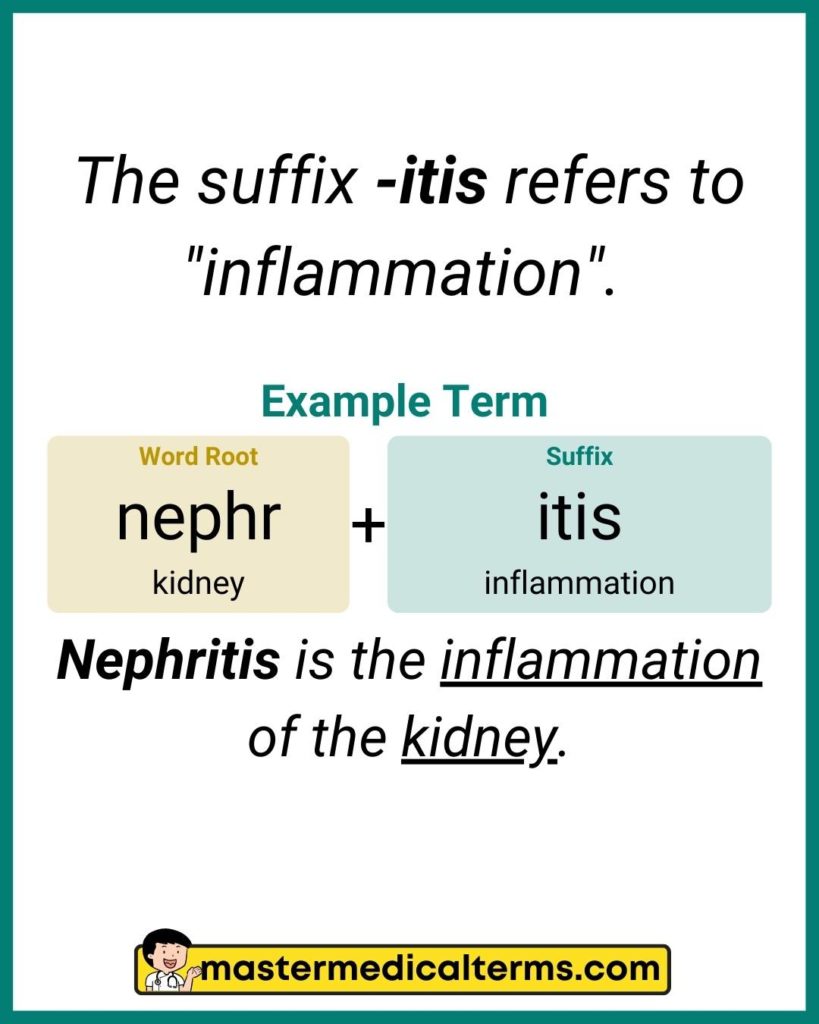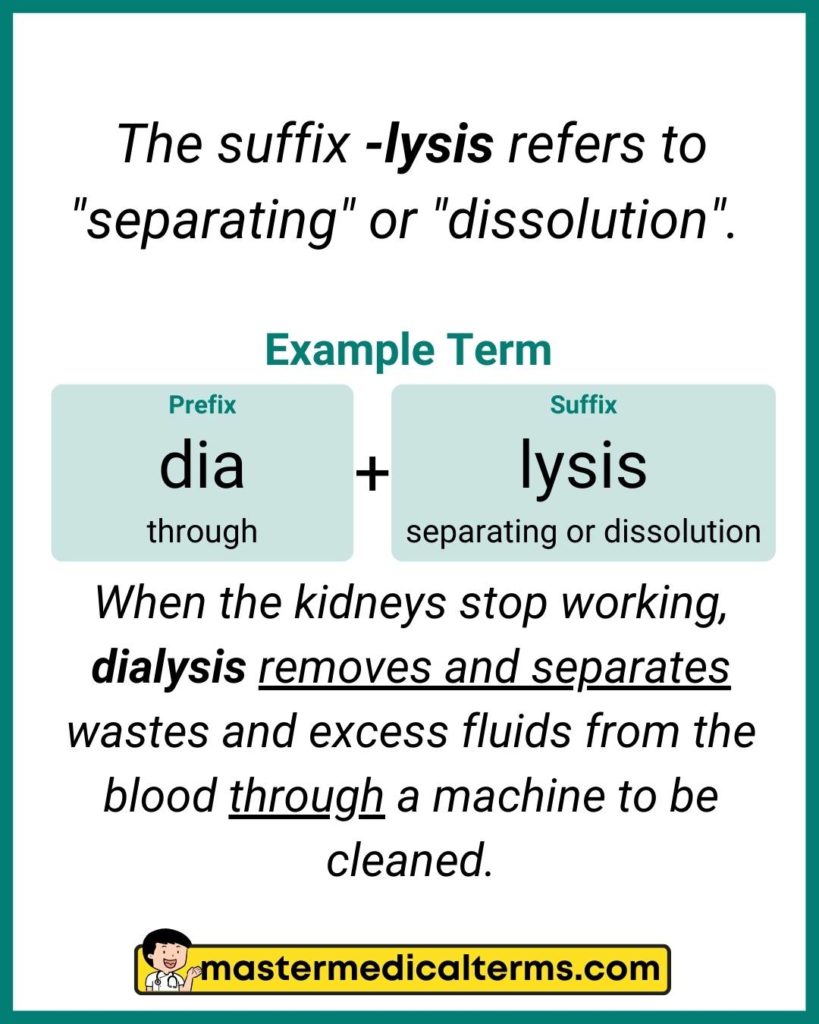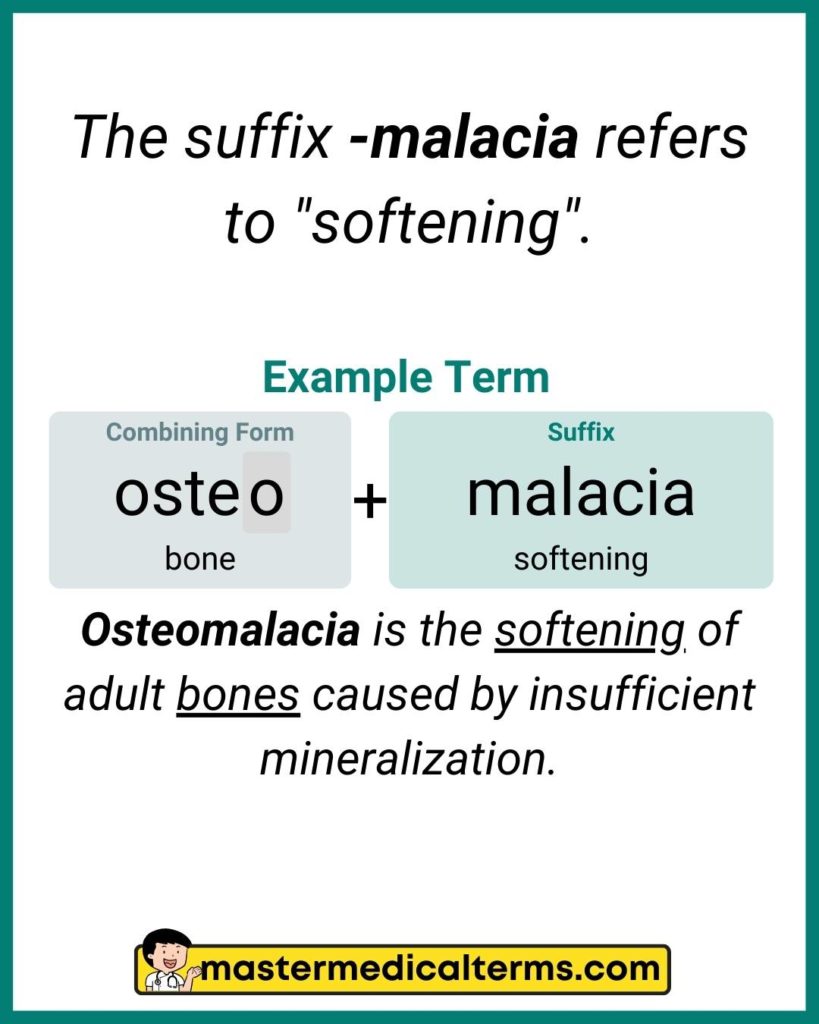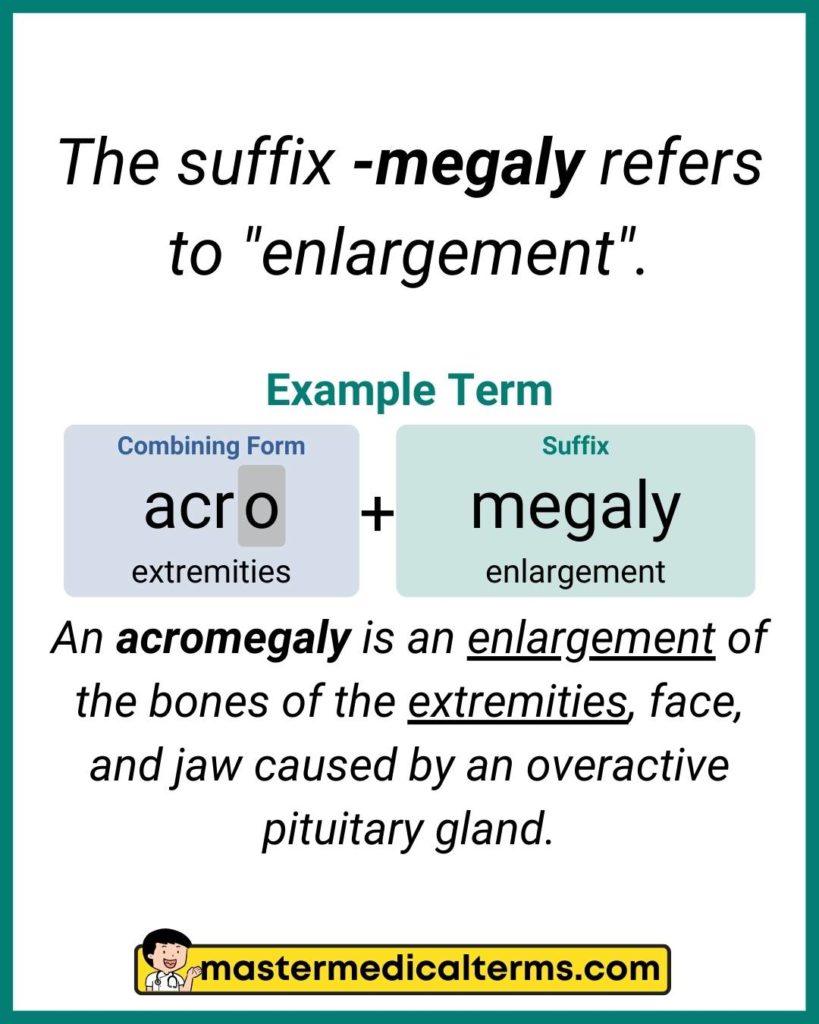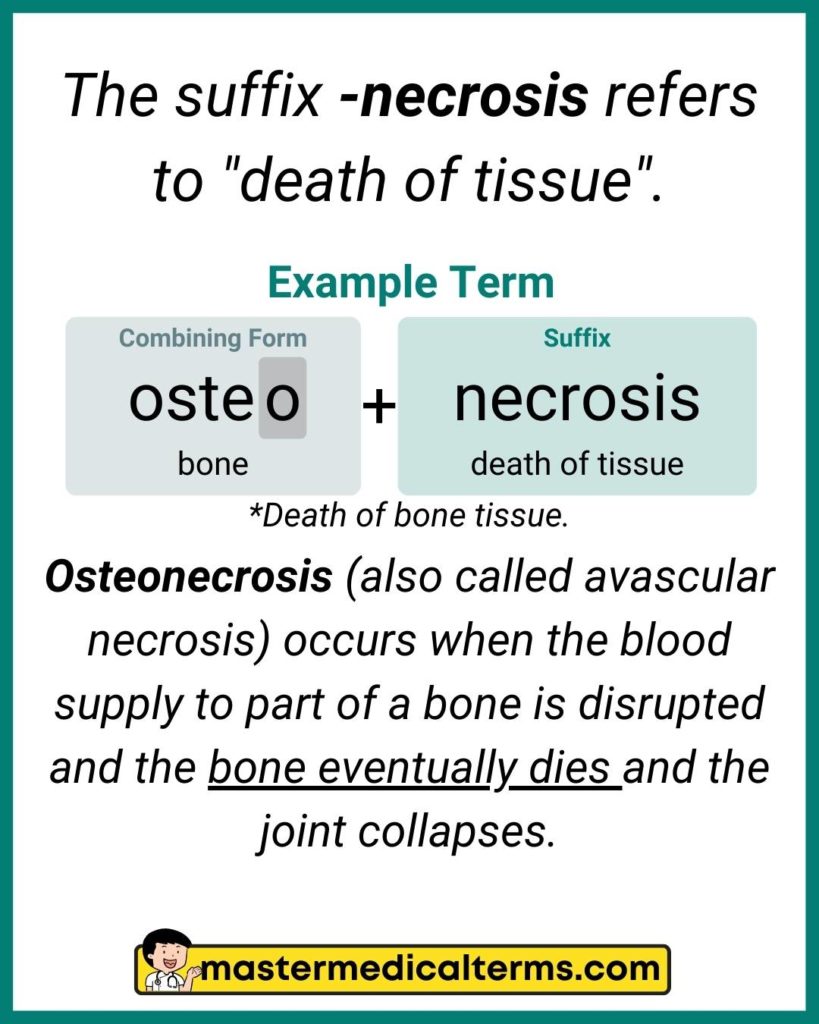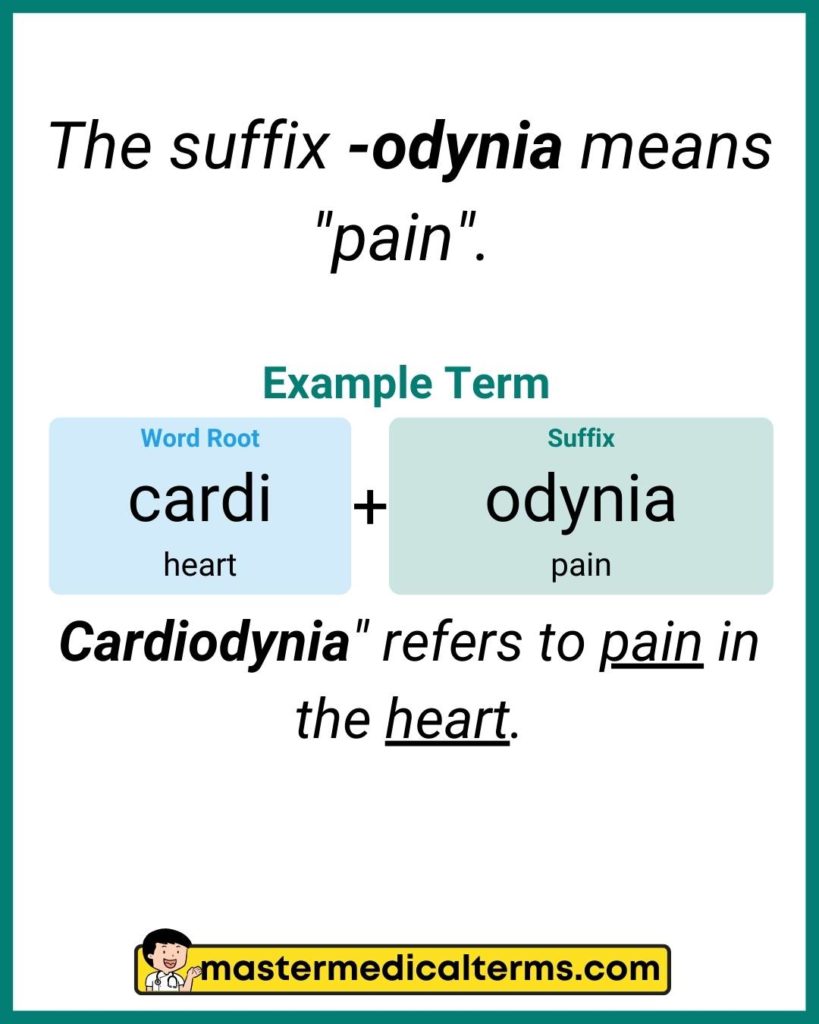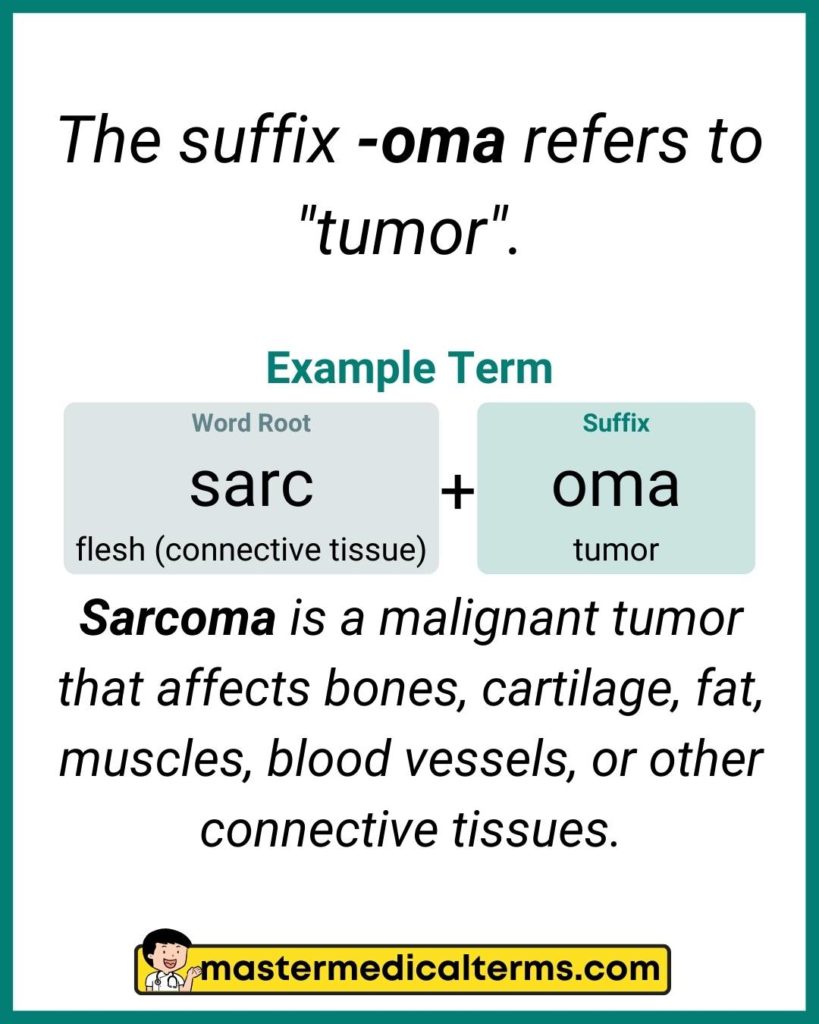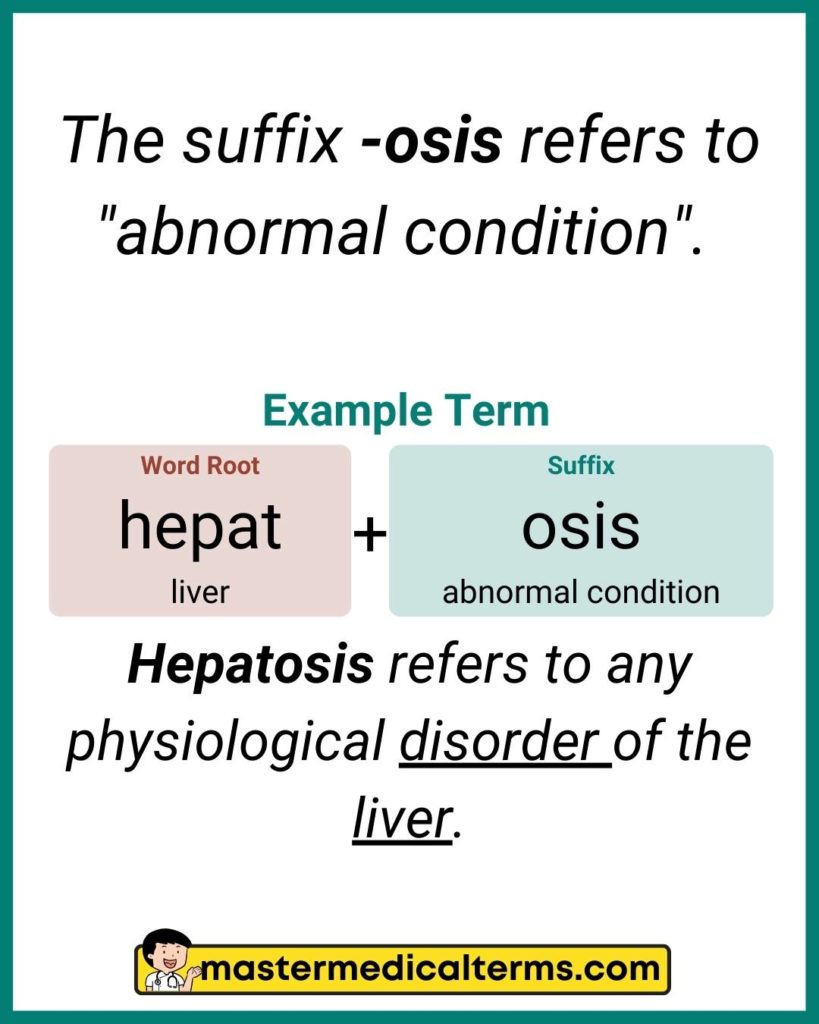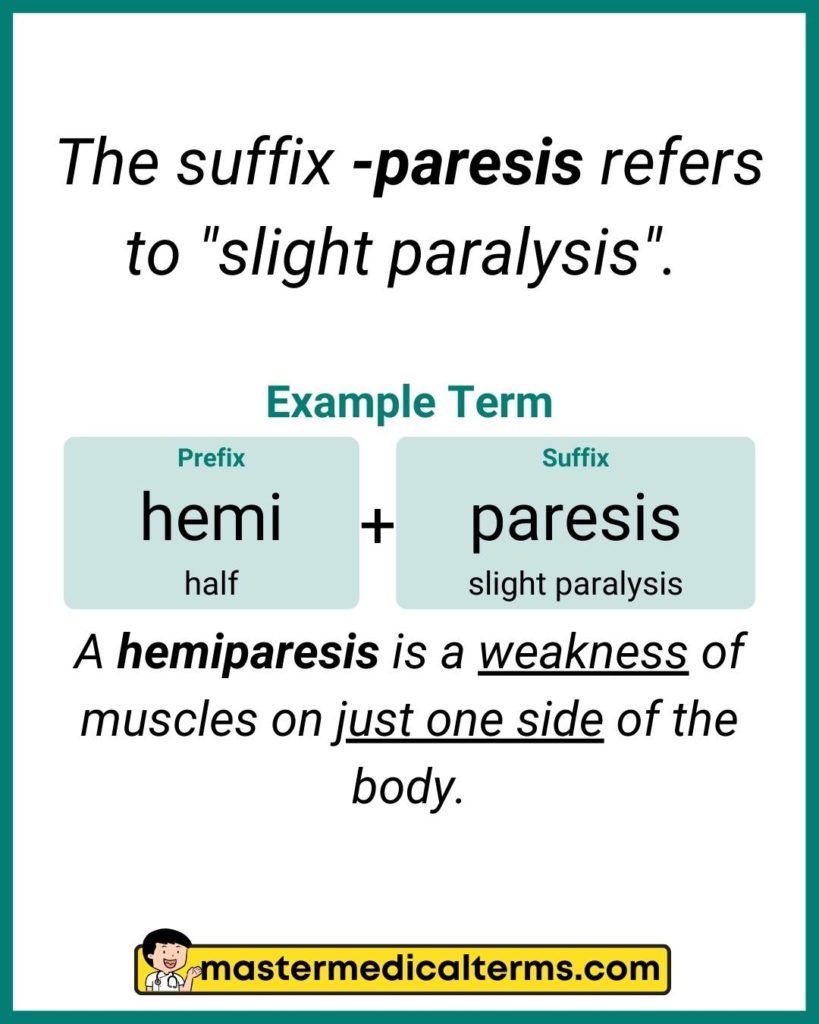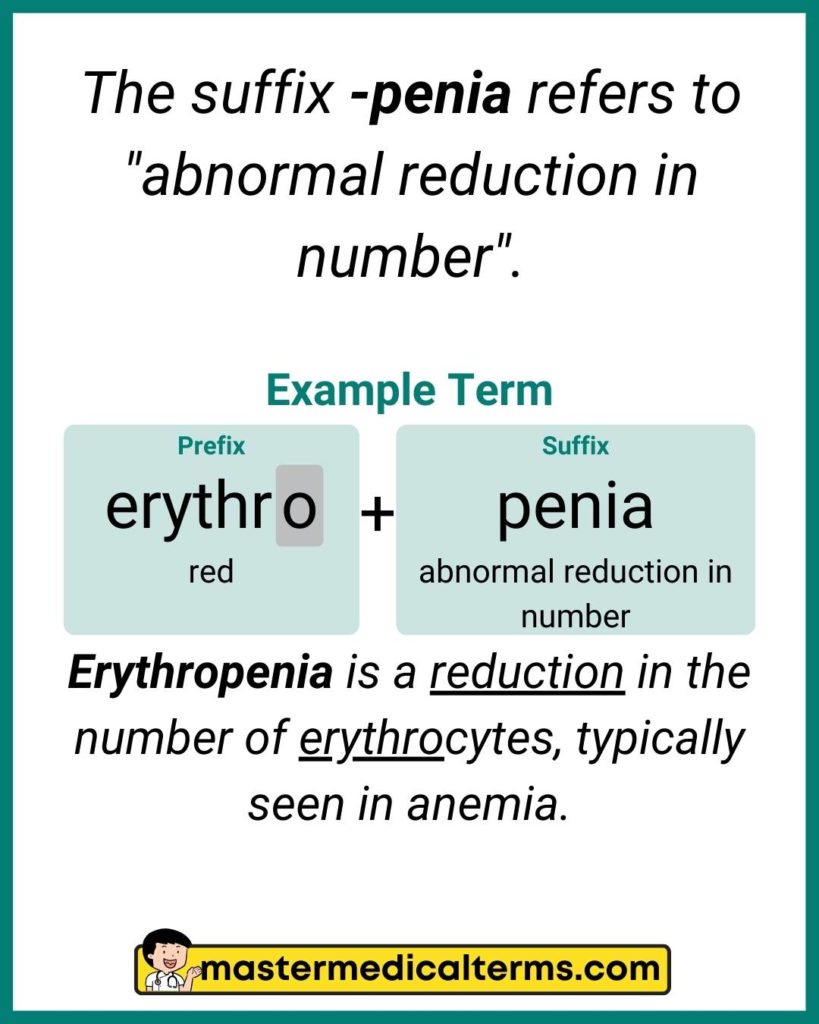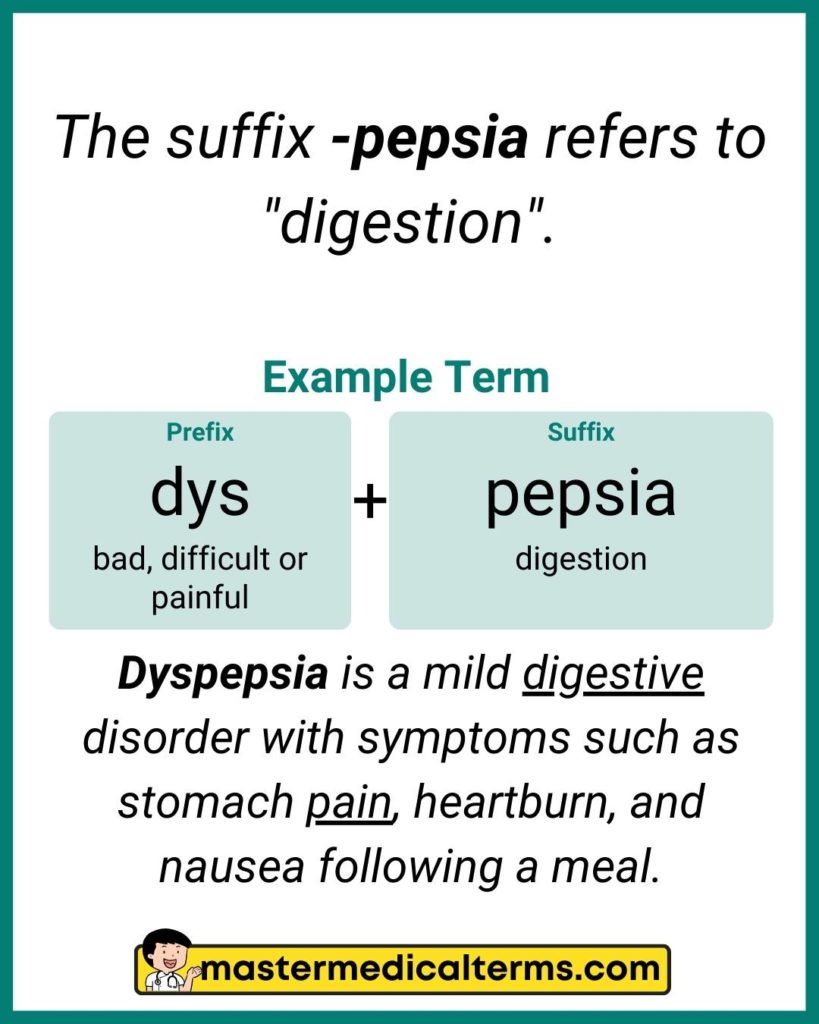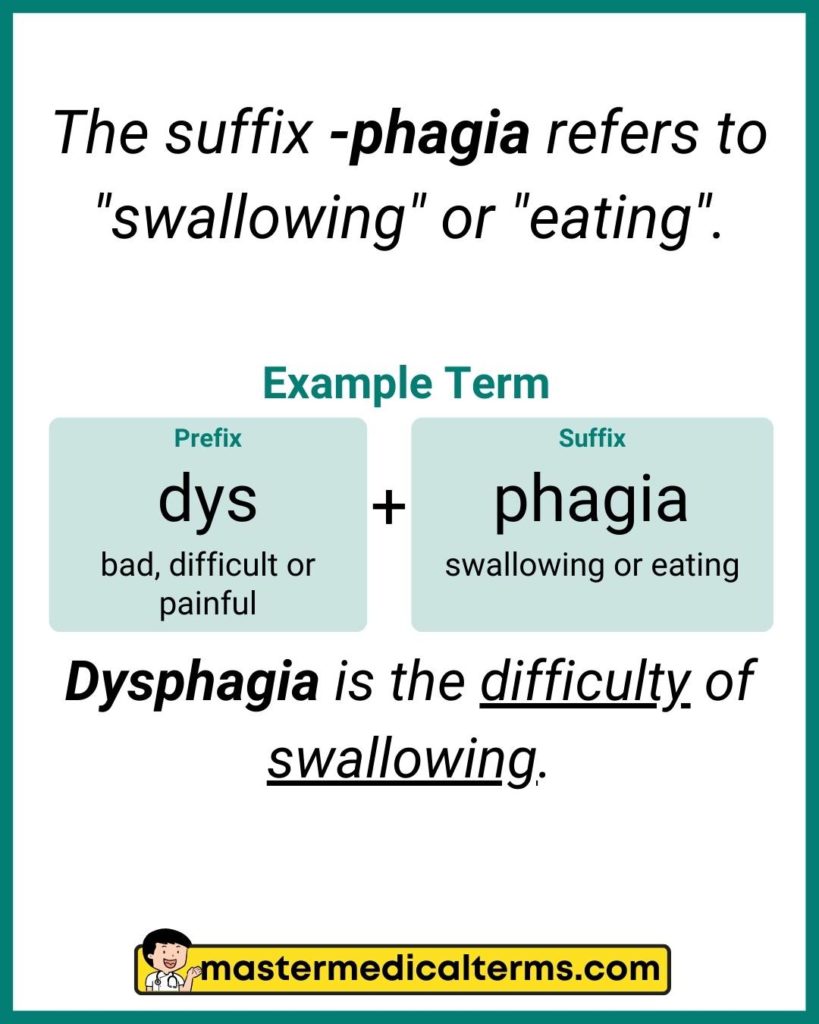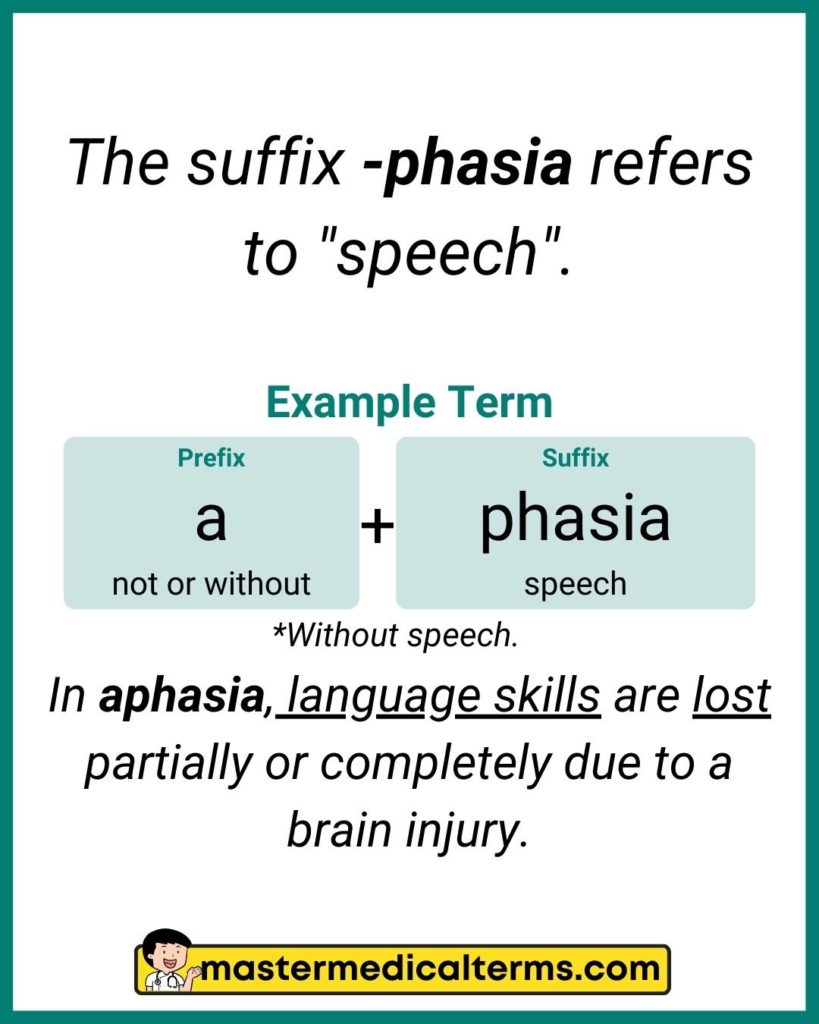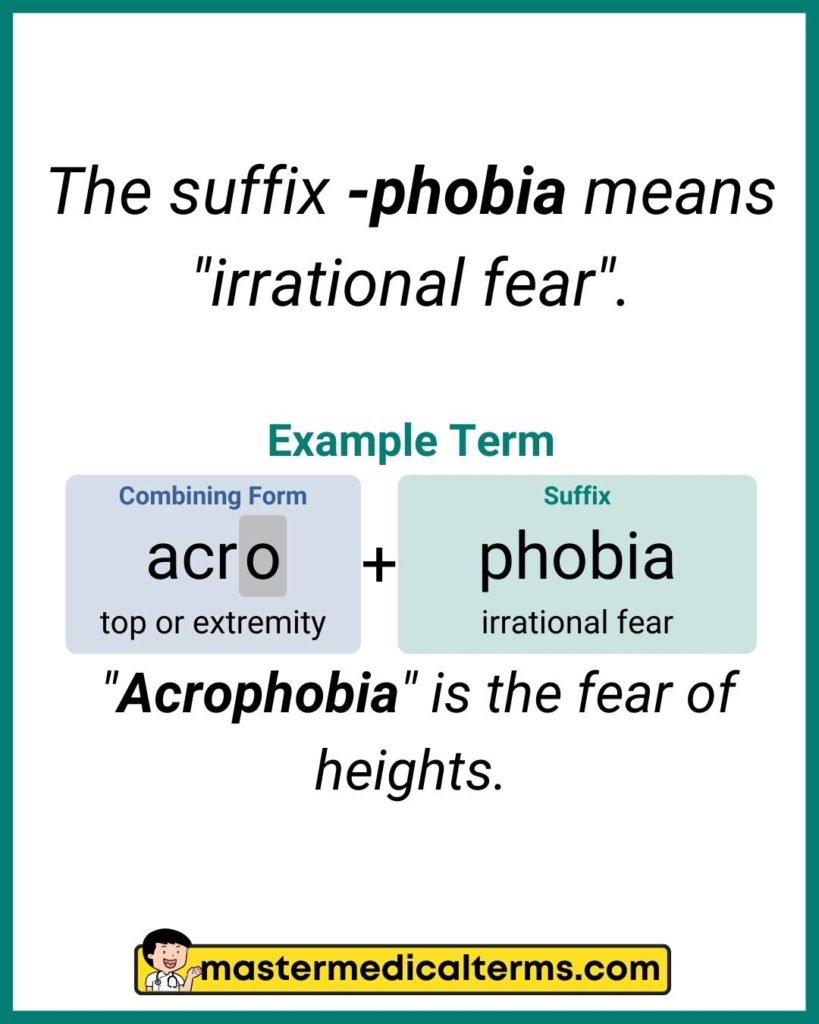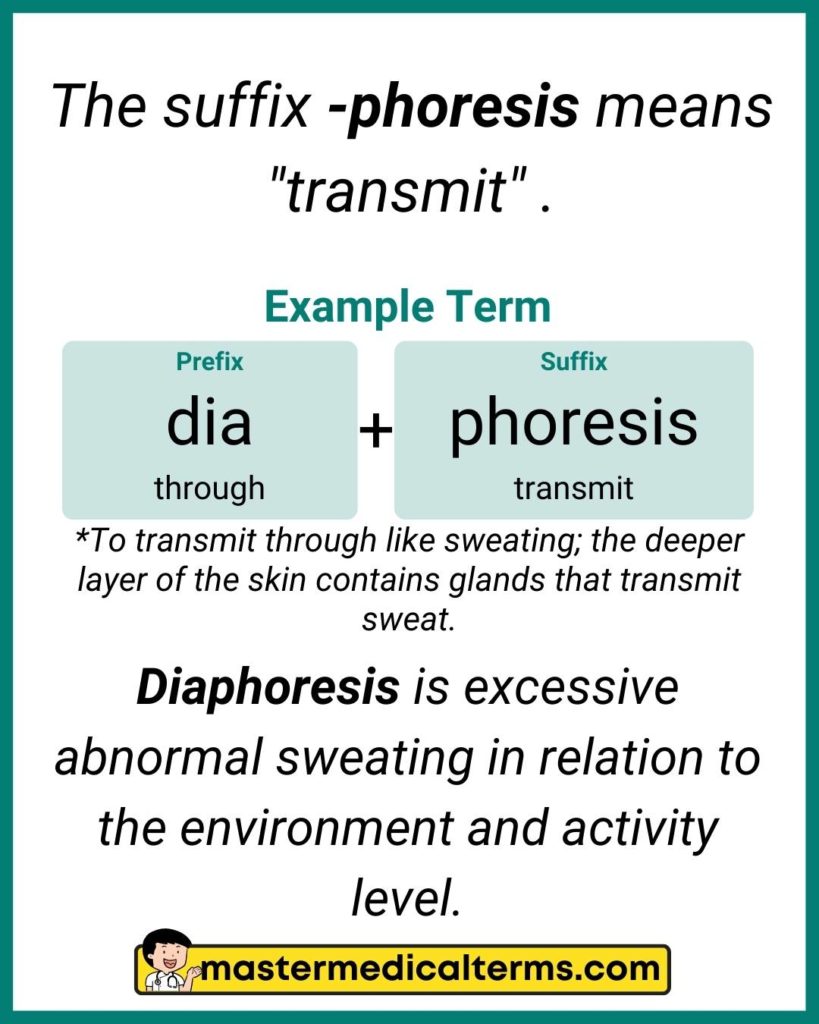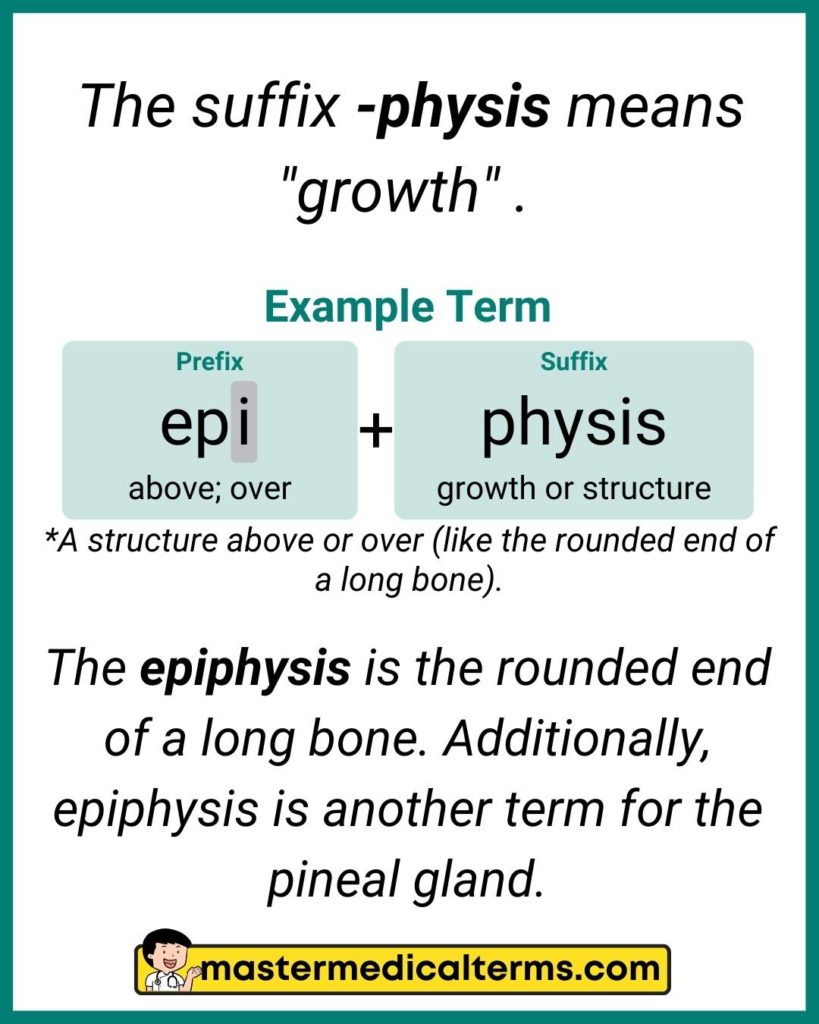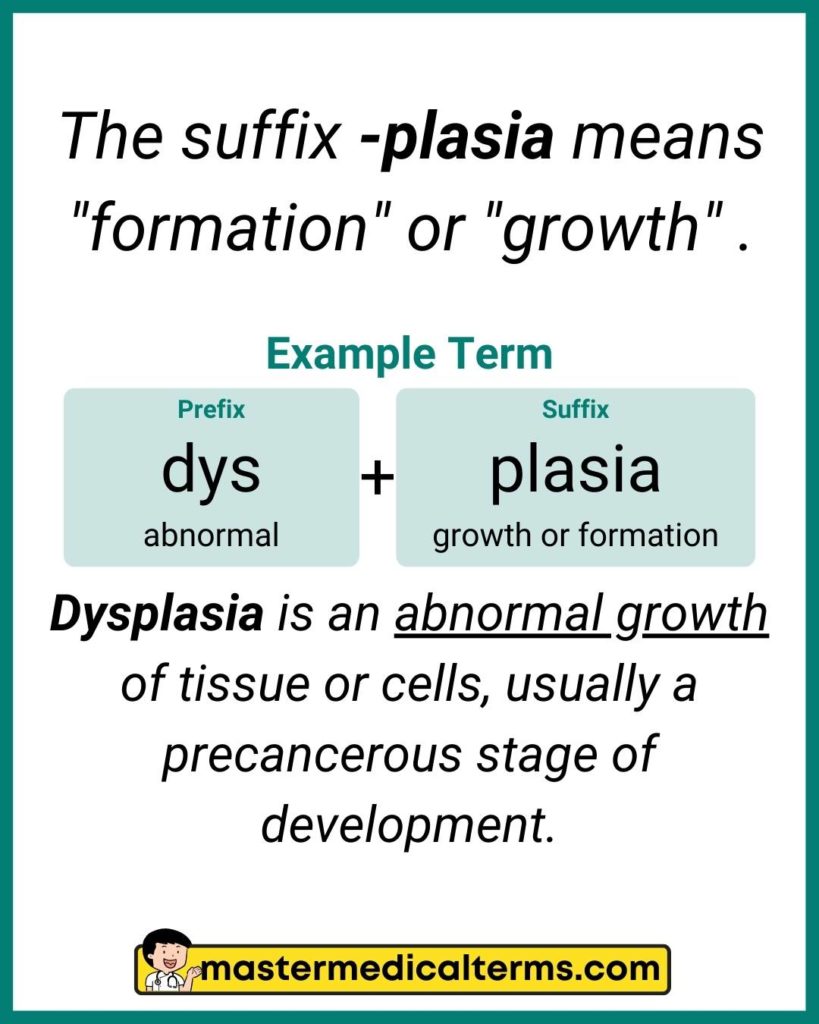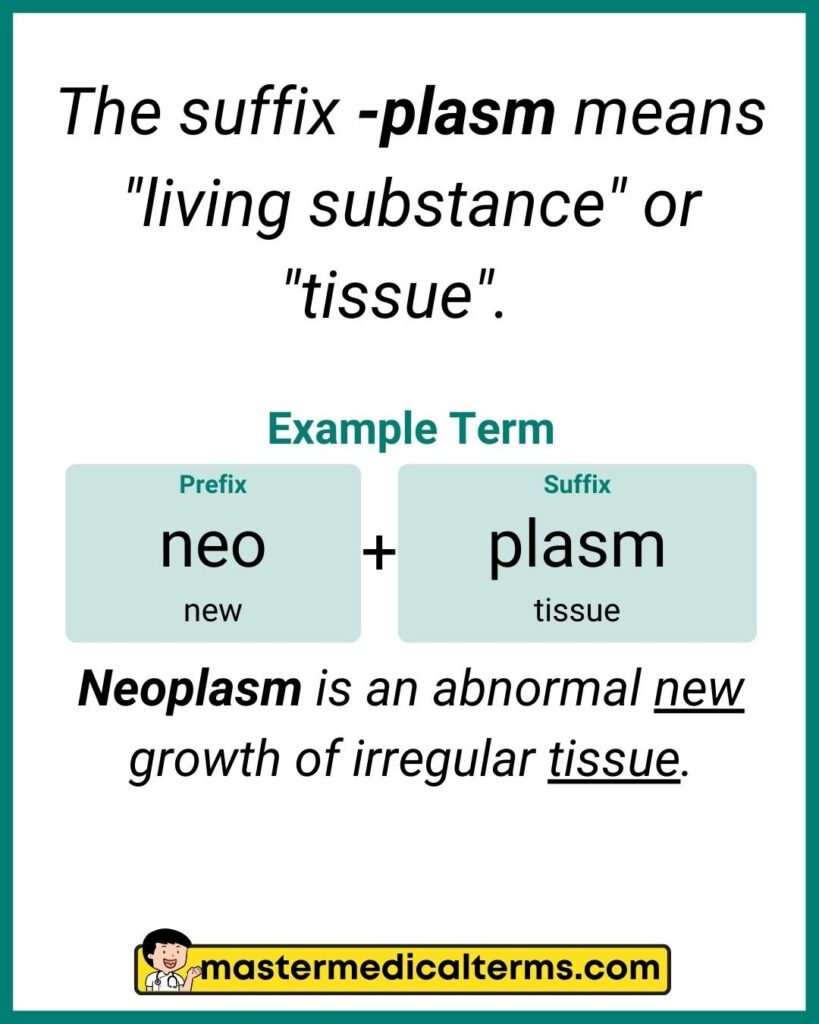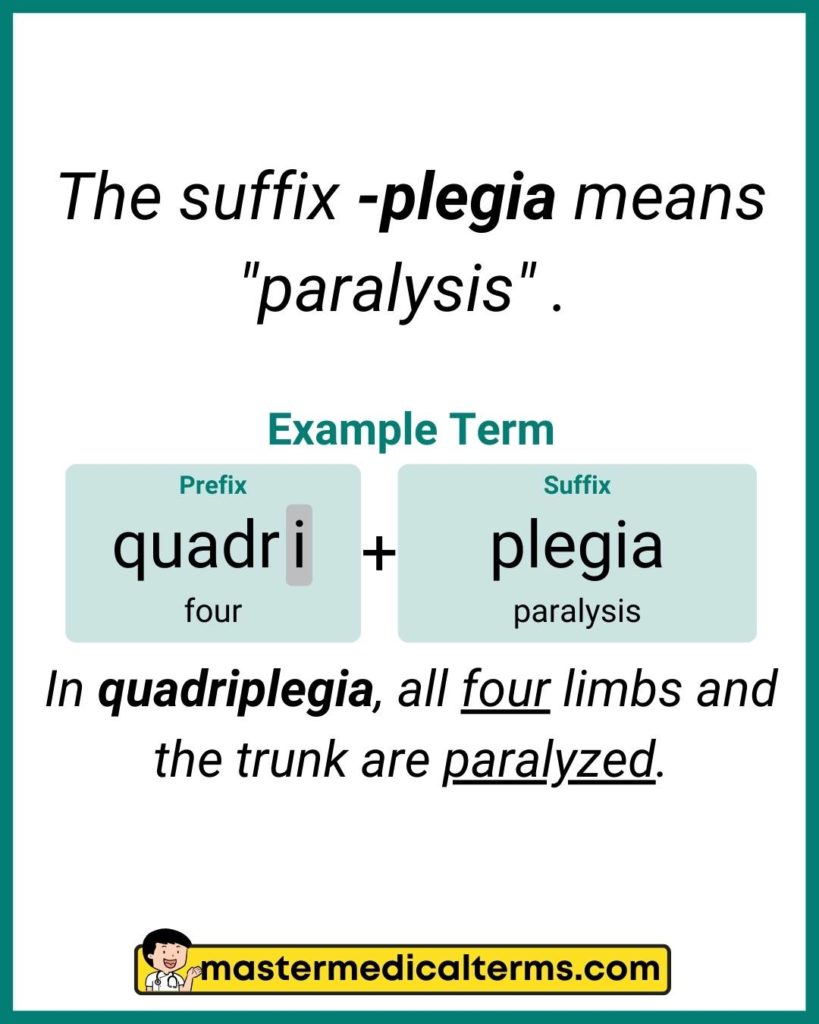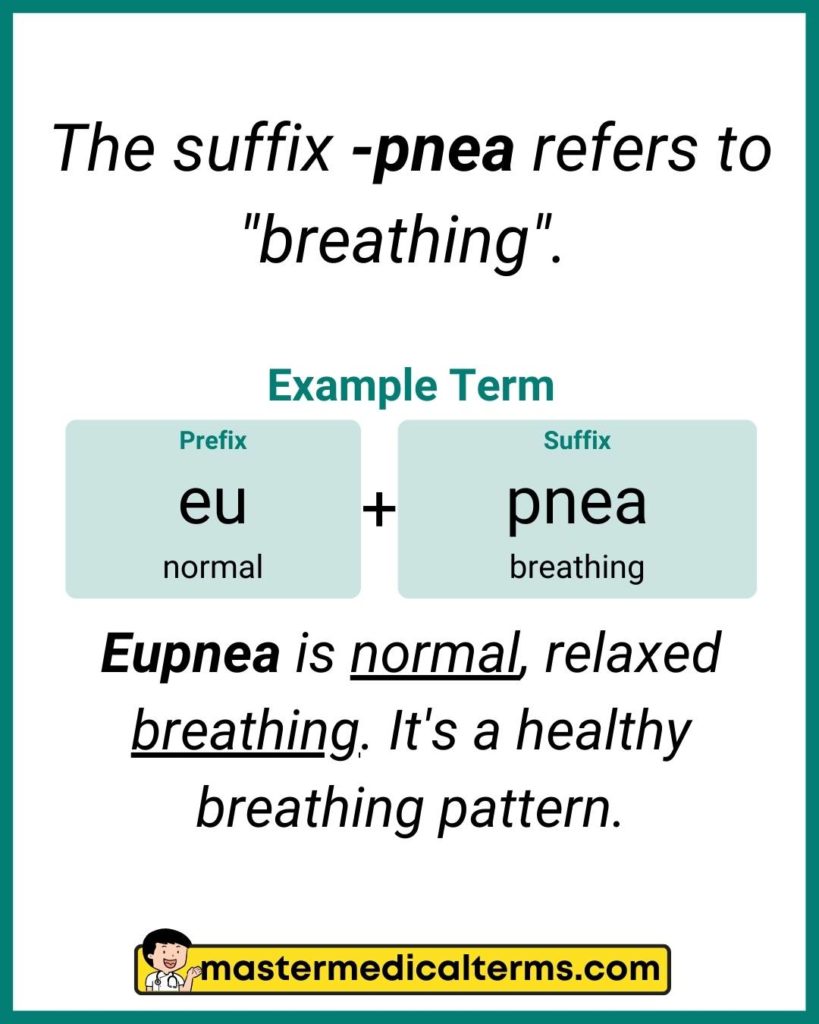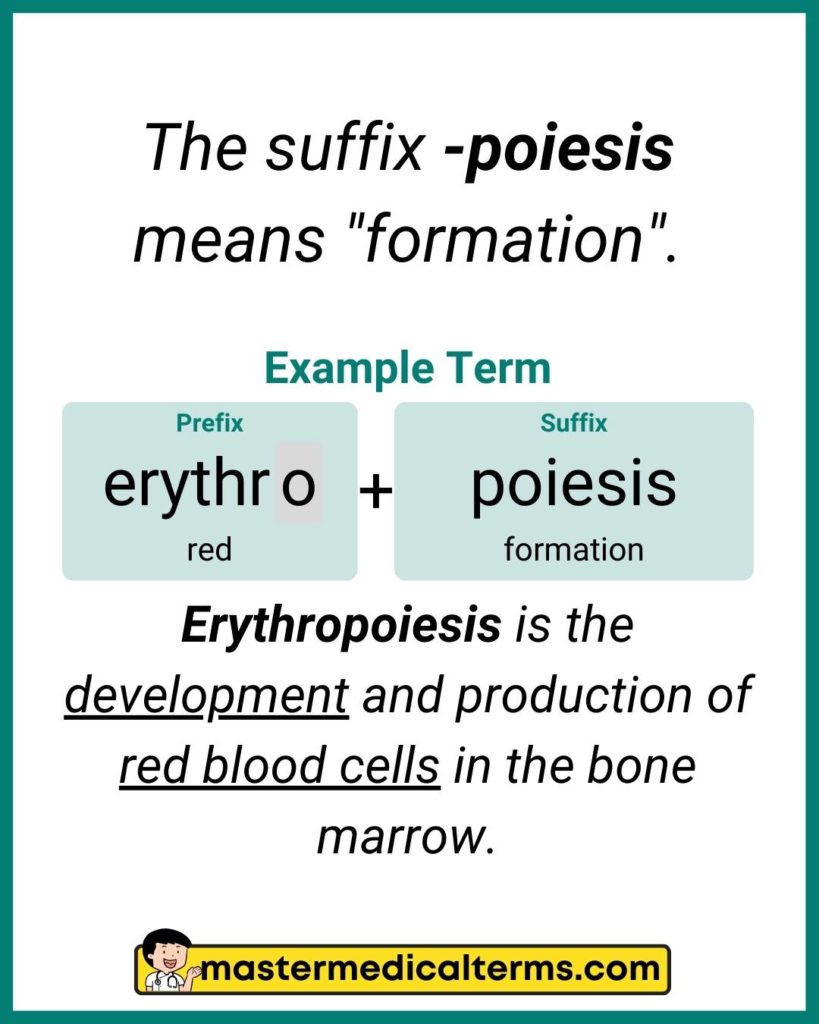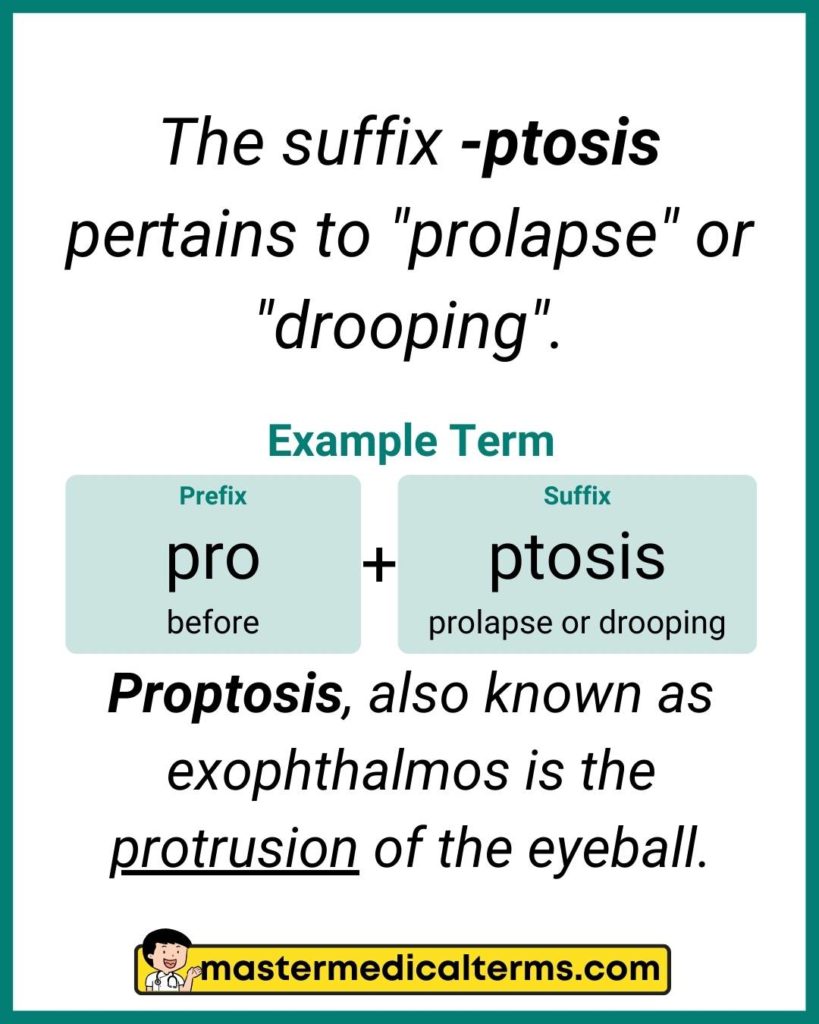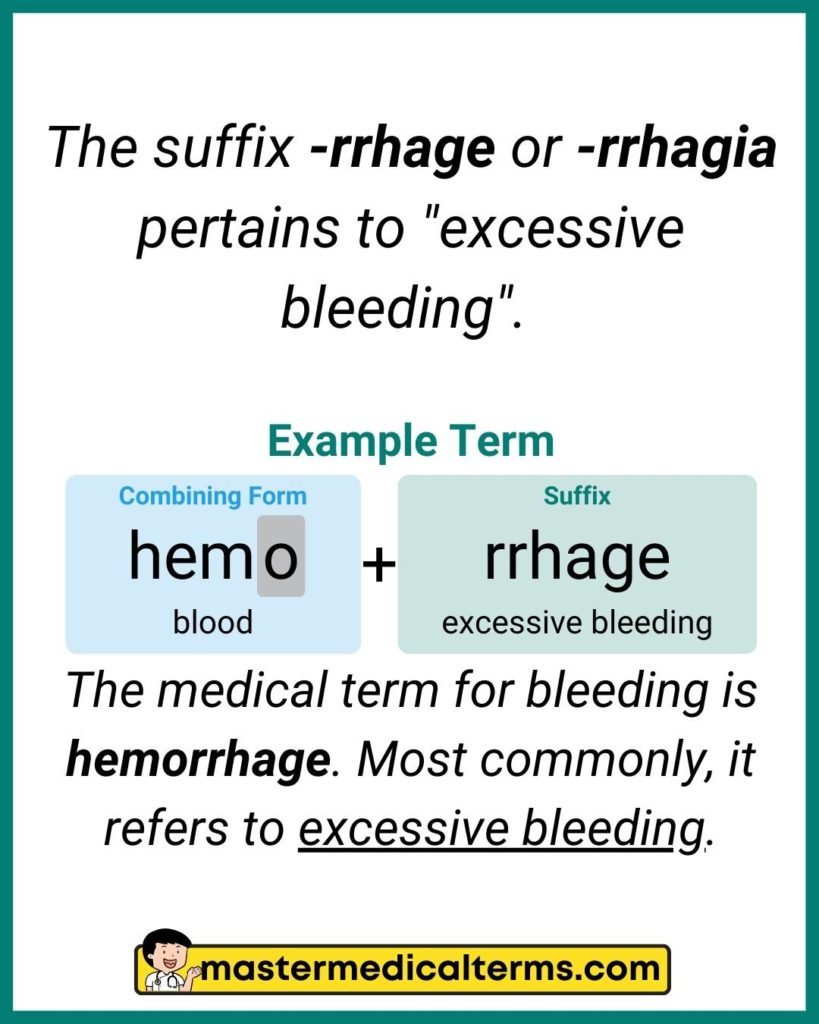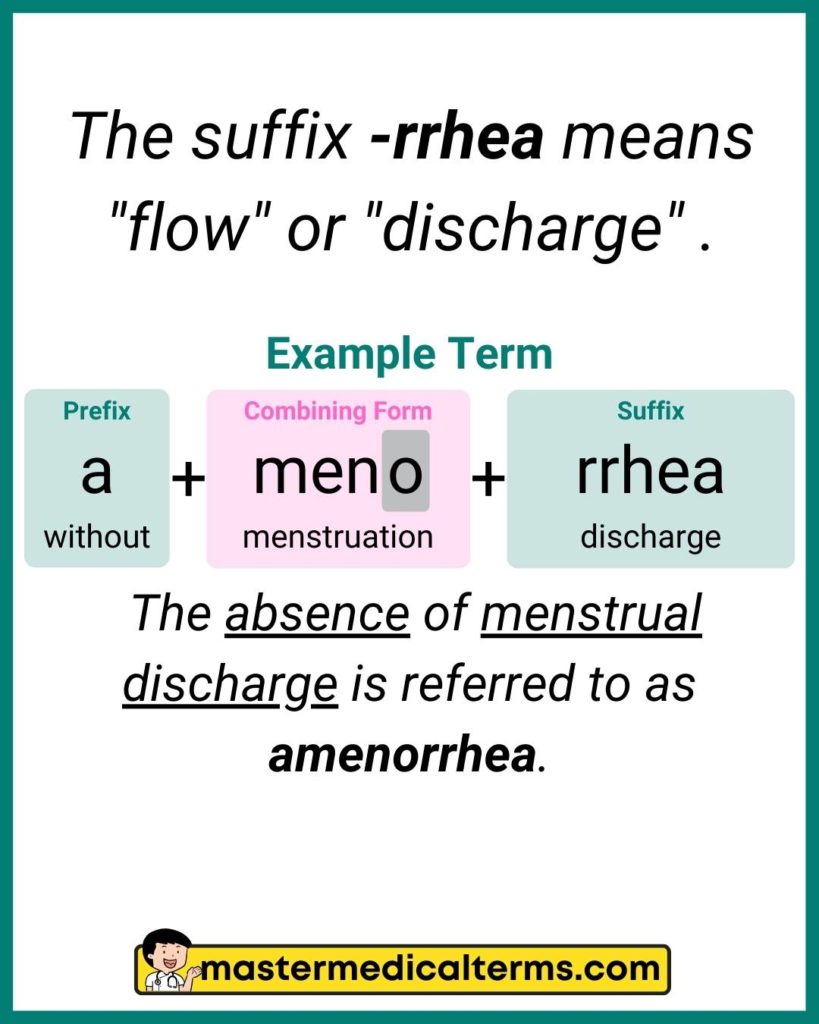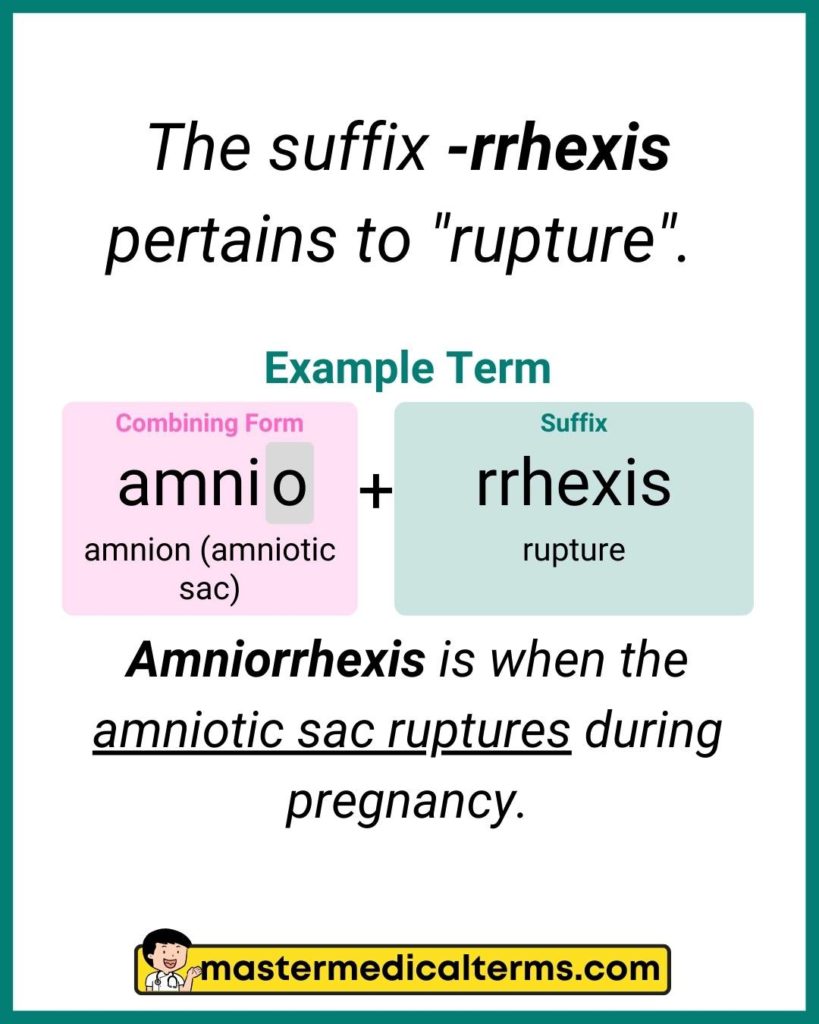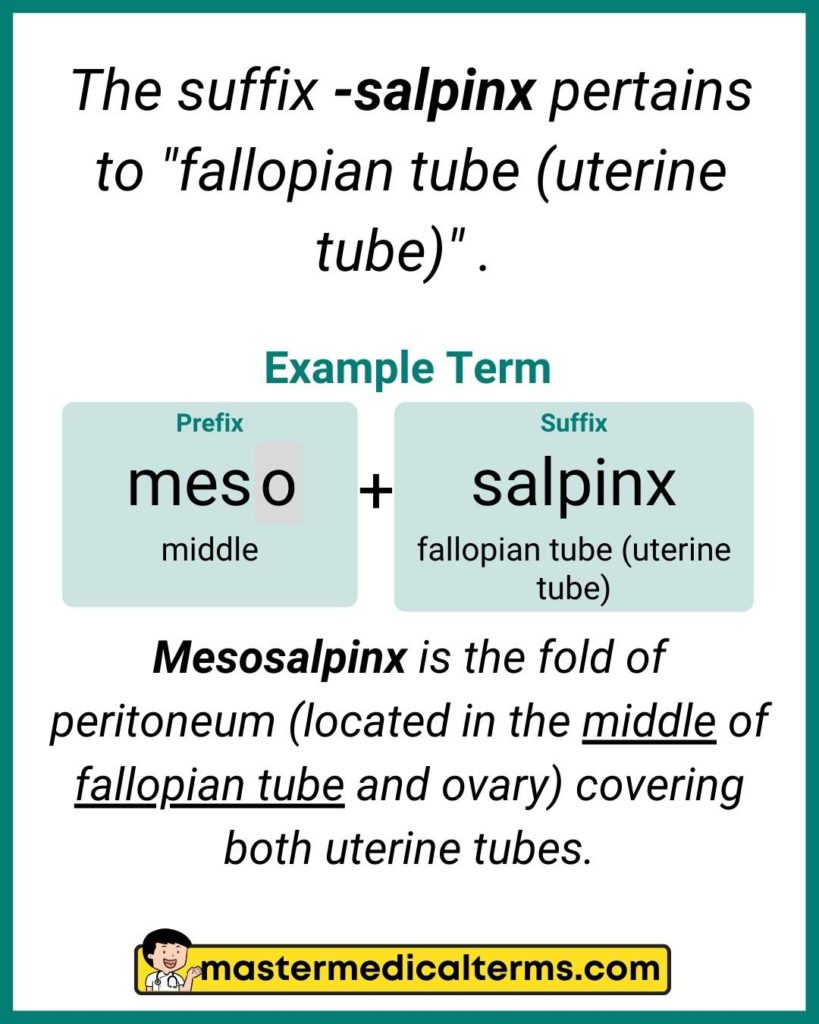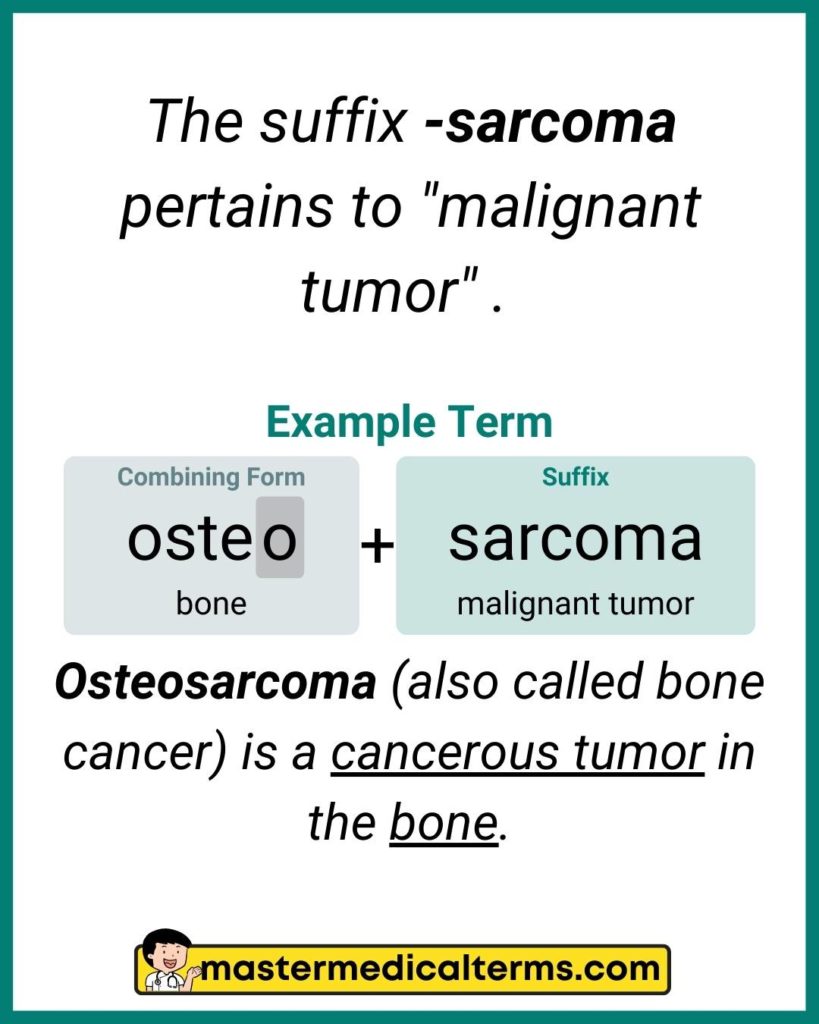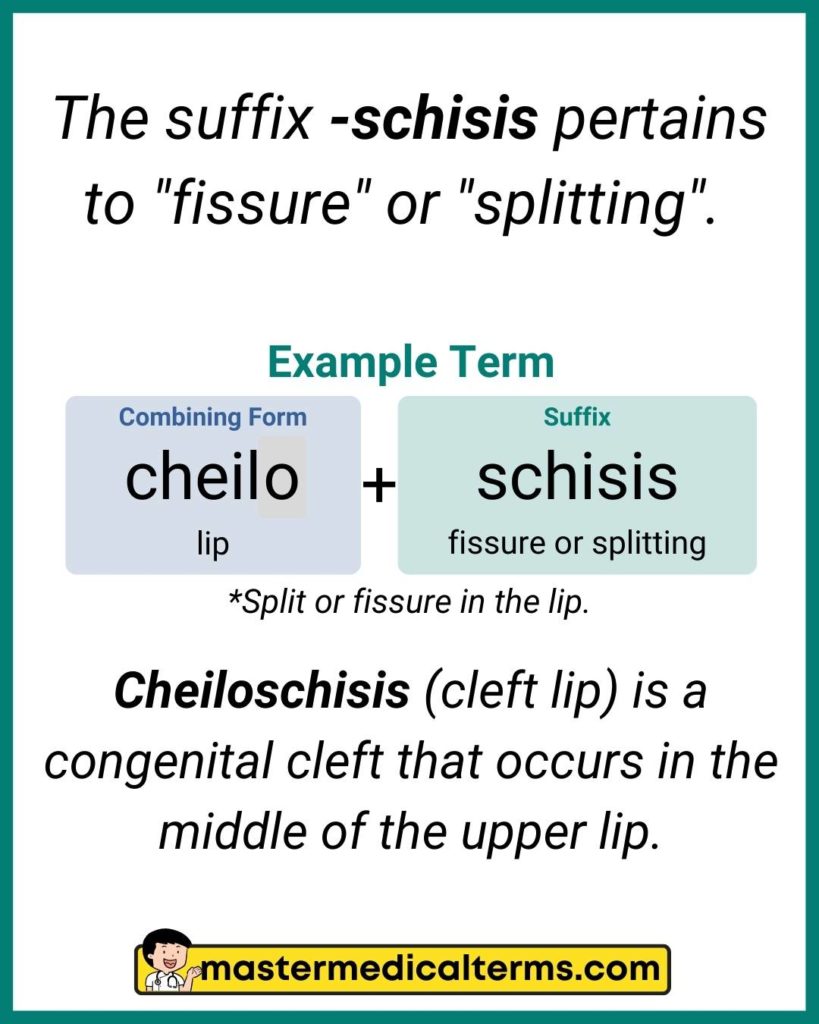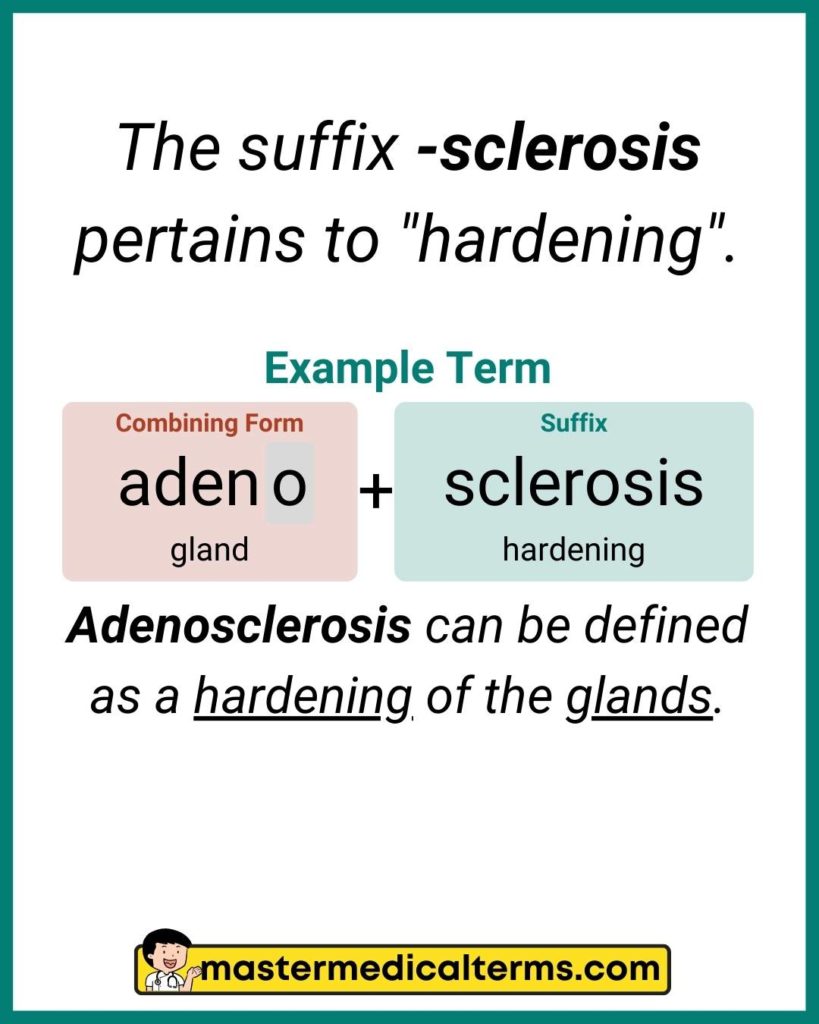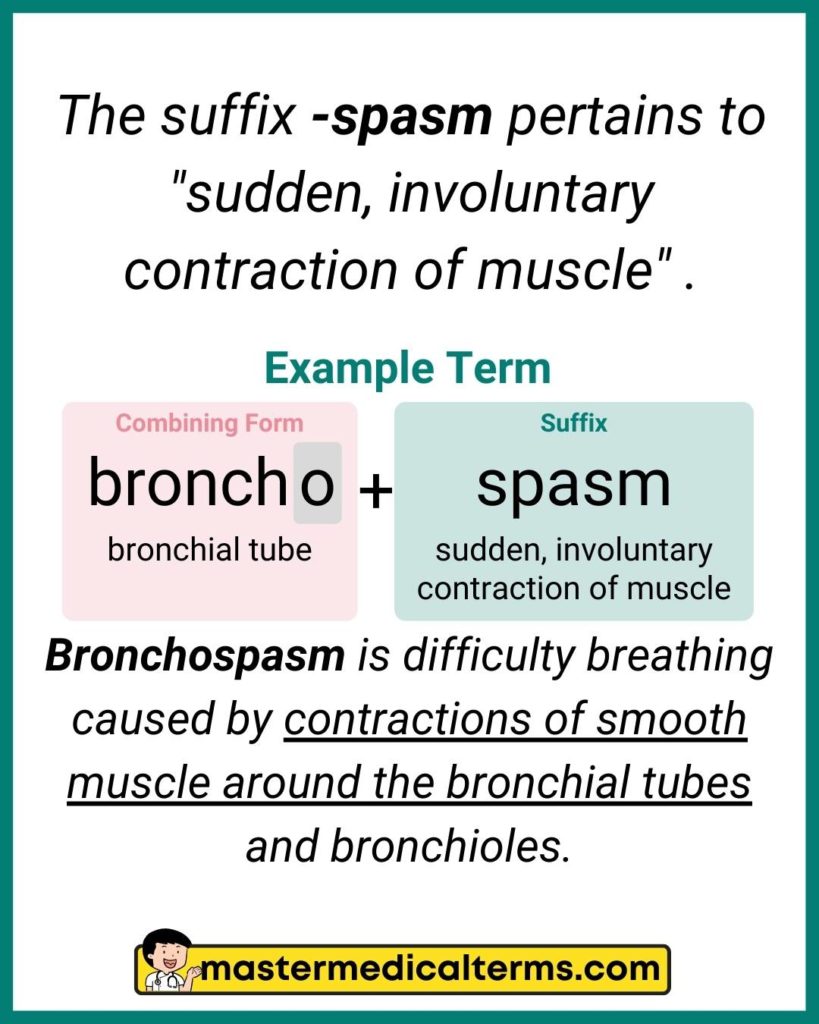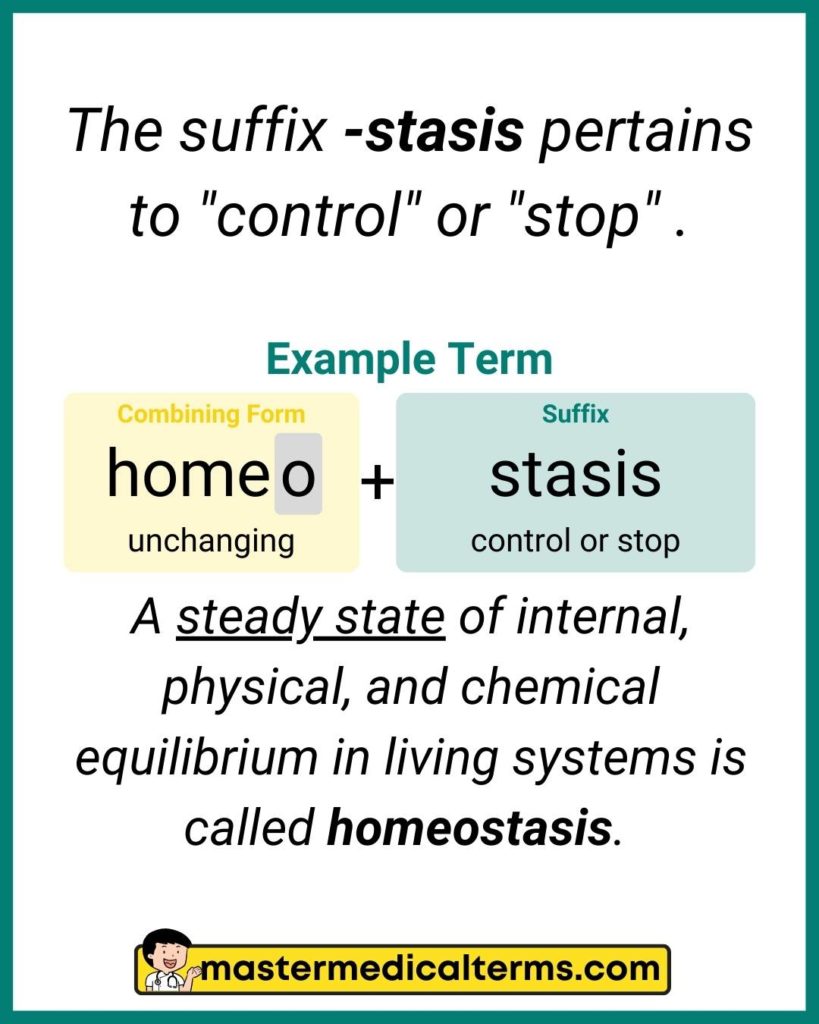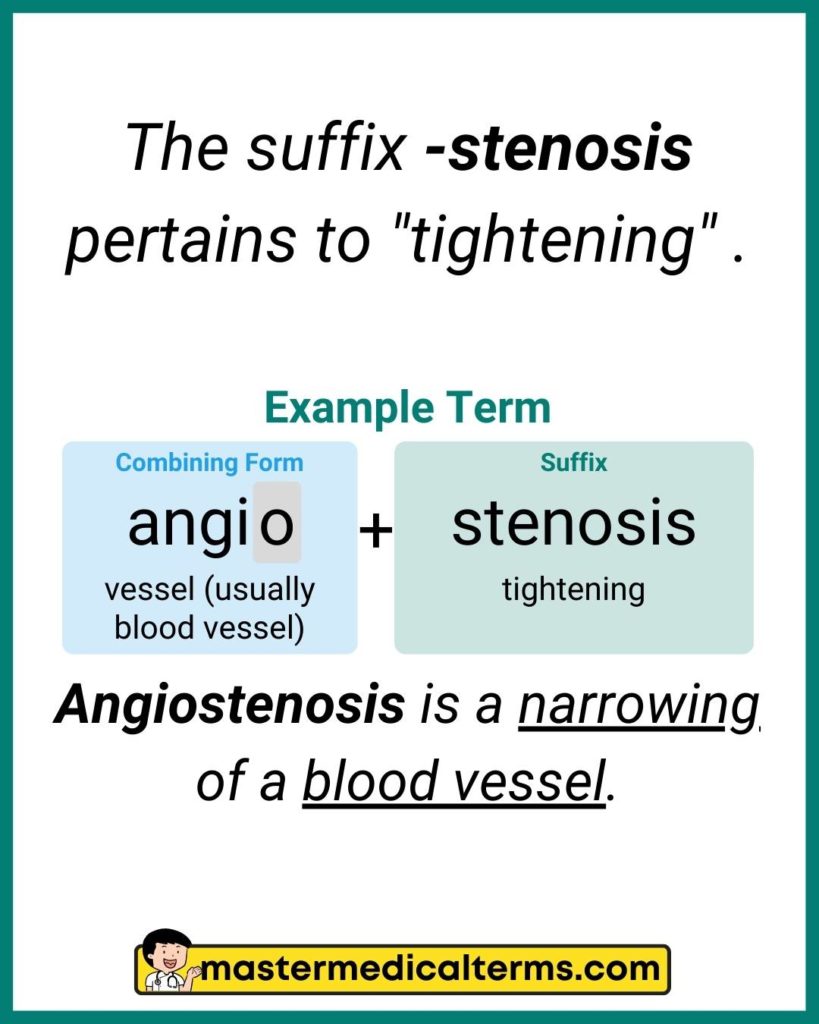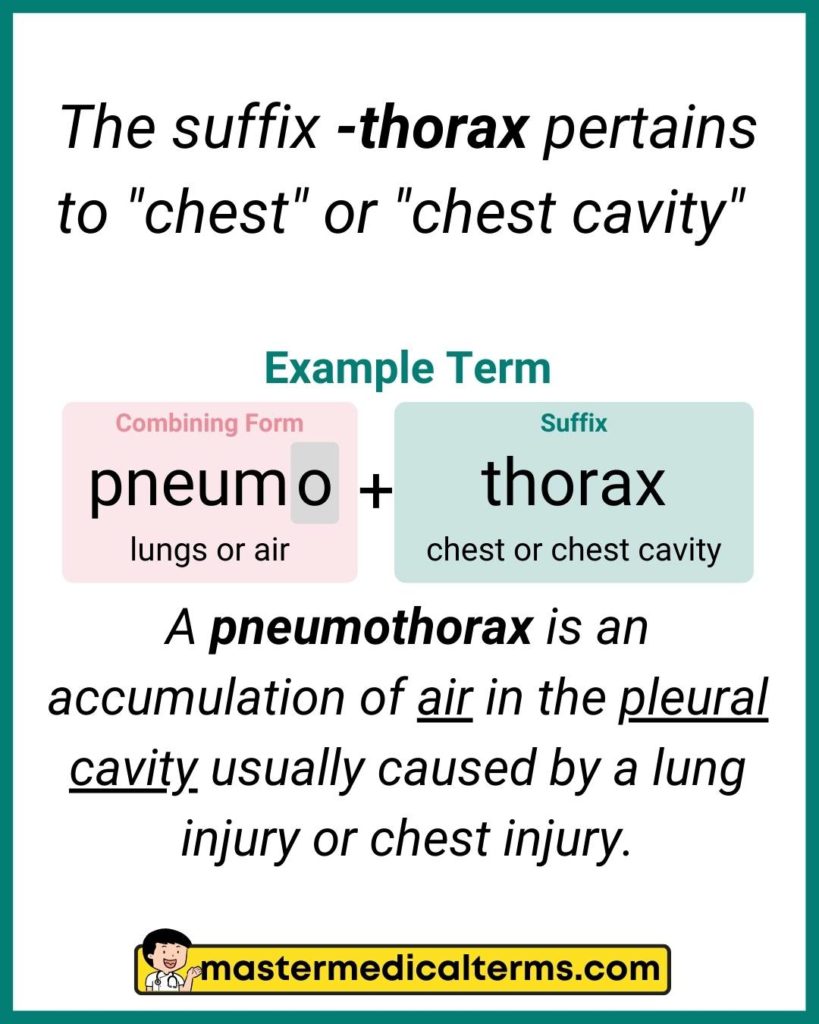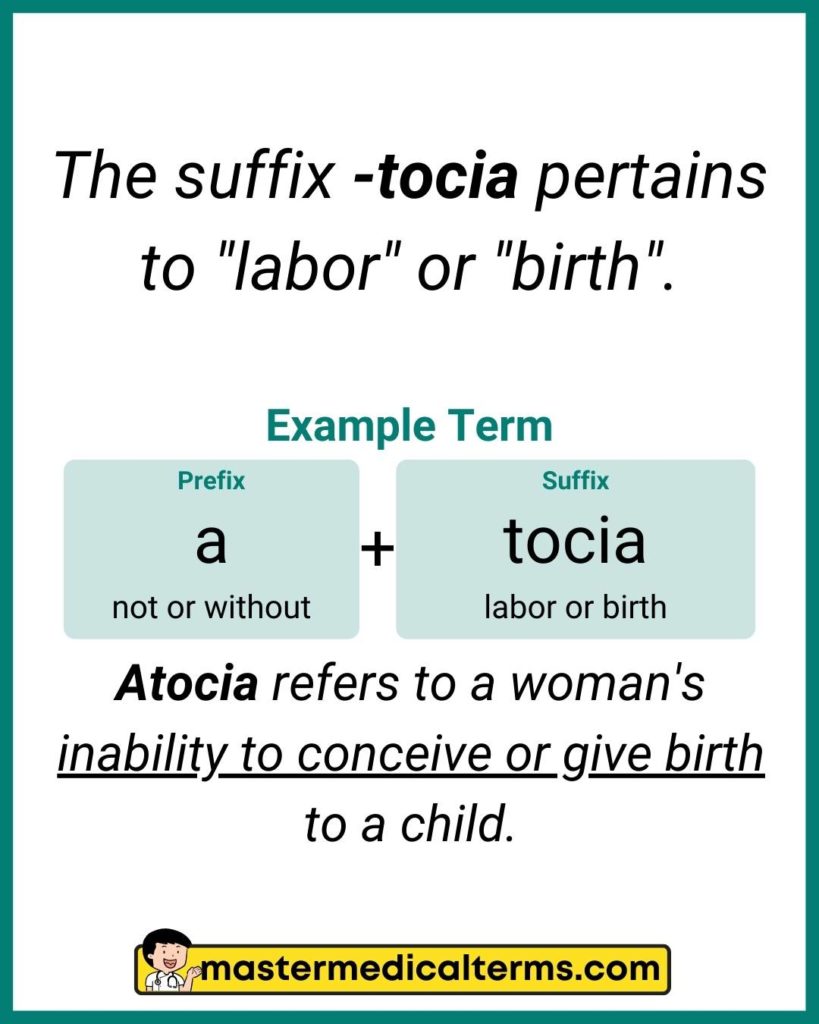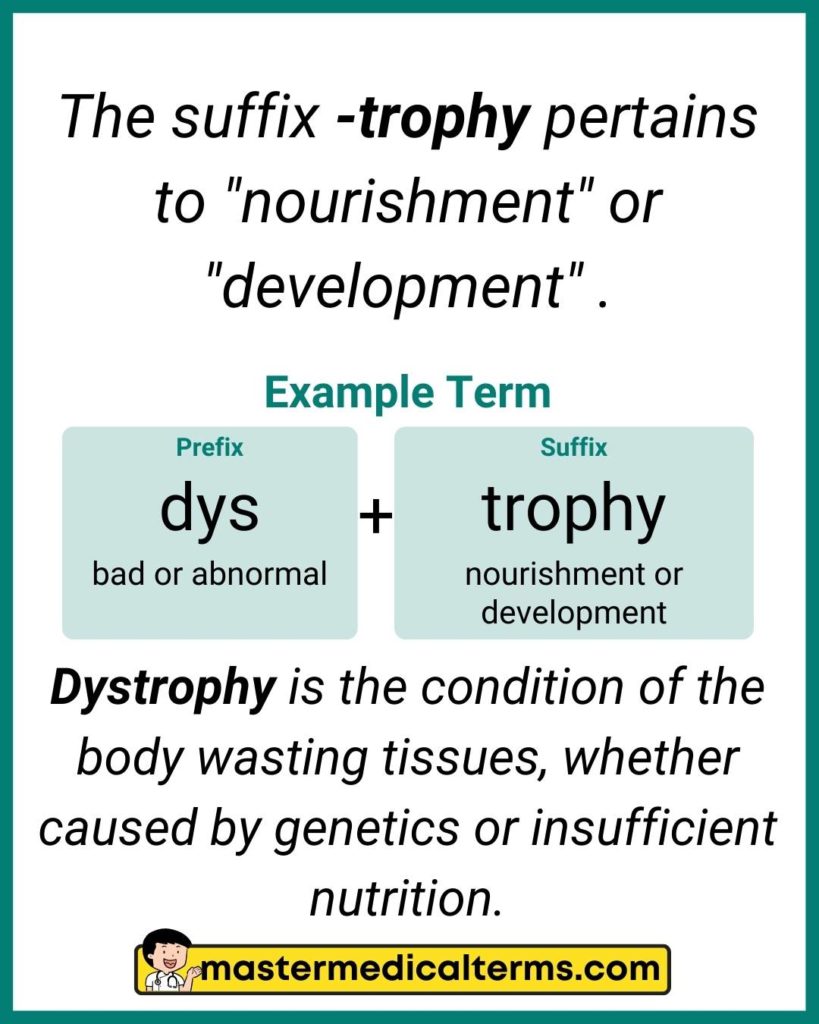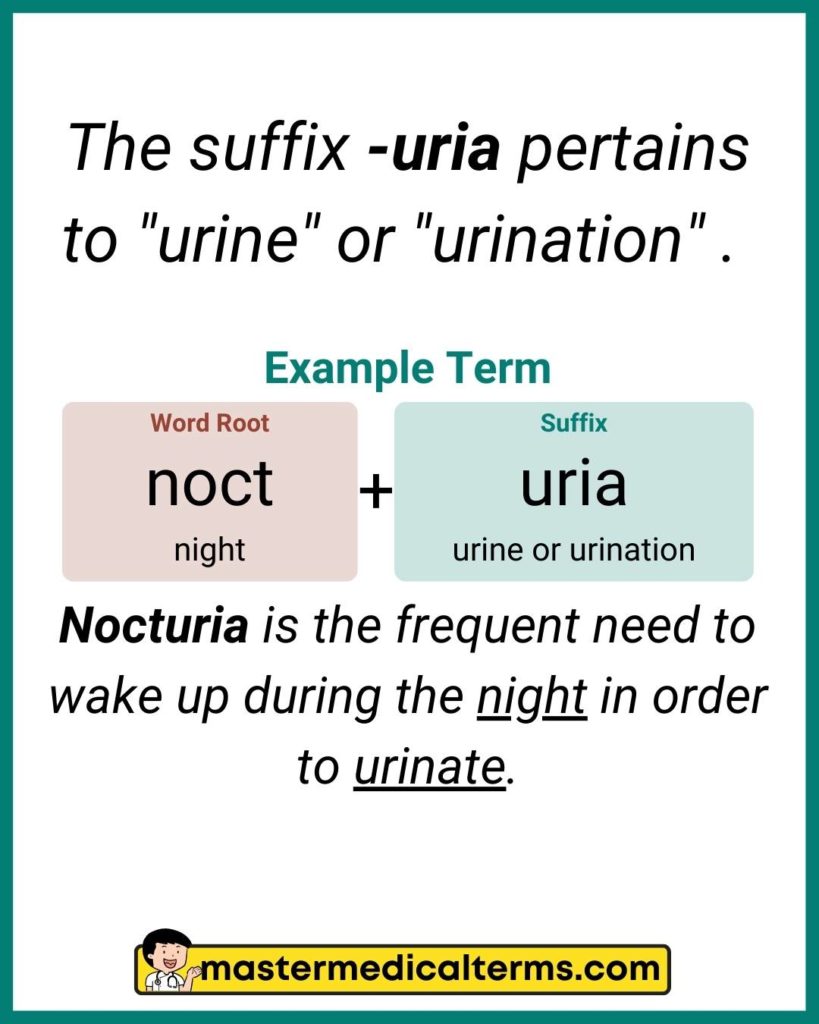We have put together a comprehensive list of the most commonly used medical term suffixes that describe disease or function of a medical term.
Check out the quiz version of this flashcard if you want to see how much you remembered.
#1 -algesia
#2 -algia
The medical suffix term -algia means "pain".
Example Word: cephal/algia
Word Breakdown: Cephal is a word root that refers to "head", and -algia refers to "pain".
Definition: Cephalalgia is the medical term for headache.
More examples of medical terms ending in -algia
Ankylalgia: ankyl/o (meaning "crooked" or "bent") + -algia (meaning "pain").
Ankylalgia is a medical condition characterized by pain in a joint or bone that has become stiff or immovable due to abnormal growth or development.
Cephalgia: cephal/o (meaning "head") + -algia (meaning "pain").
Cephalgia, or headache, is a common medical condition marked by pain in the head, scalp, or neck. The cause of cephalgia can be tension, illness, or underlying medical conditions, and the severity can range from mild to severe.
Dentalgia: dental (meaning "relating to the teeth") + -algia (meaning "pain").
Dentalgia is a medical condition that causes pain in the teeth or surrounding tissues. It may be caused by tooth decay, gum disease, dental abscesses, or tooth injuries, and can range in severity from mild to severe. Treatment for dentalgia may involve dental care, such as fillings, root canals, or extractions, and can also be managed with pain medications.
Fibromyalgia: fibr/o (meaning "fiber") + my/o (meaning "muscle") + "-algia" (meaning "pain").
Fibromyalgia is a medical condition marked by widespread muscle pain, fatigue, and tenderness in specific areas of the body. Other symptoms that may also be present include sleep disturbances, cognitive difficulties, and mood changes. Fibromyalgia can be challenging to diagnose as it does not appear on standard laboratory or imaging tests.
Gastralgia: gastr/o (meaning "stomach") + -algia (meaning "pain")
Gastralgia is a medical condition that causes pain in the stomach. It may be caused by indigestion, stomach ulcers, gastritis, or inflammatory bowel disease and can range in severity from mild to severe. Treatment for gastralgia may include medications, dietary changes, or lifestyle modifications, depending on the cause of the pain.
Gynalgia: gyn (meaning "woman") + -algia (meaning "pain")
Gynalgia is a medical condition that causes pain in the female reproductive system. It may be caused by menstrual cramps, endometriosis, uterine fibroids, or pelvic inflammatory disease, and can range in severity from mild to severe.
Ischialgia: ischial (meaning "relating to the hip or sitting bones") + -algia (meaning "pain").
Ischialgia is a medical condition characterized by pain in the hip or sitting bones.
Lumbalgia: lumb/o (meaning "loin" or "lower back") + -algia (meaning "pain").
Lumbalgia is a medical condition characterized by pain in the lower back.
Myalgia: my (meaning "muscle") + -algia (meaning "pain").
Myalgia is a condition characterized by muscle pain. It may be caused by overuse, injury, or underlying medical conditions and can range in severity from mild to severe.
Neuralgia: neur (meaning "nerve") + -algia (meaning "pain").
Neuralgia is a medical condition that causes severe pain along the course of a nerve. It is often caused by irritation or damage to the nerve and can be treated with medications, nerve blocks, or surgery.
#3 -asthenia
The medical suffix term -asthenia means "weakness".
Example Word: my/asthenia
Word Breakdown: My is a word root that pertains to "muscle", and -asthenia refers to "weakness".
Definition: Myasthenia gravis is disorder characterized by weakness and quick fatigue of muscles under voluntary control, especially those controlling the limbs, eyes, and mouth.
#4 -carcinoma
The medical suffix term -carcinoma refers to "cancerous tumor".
Example Word: aden/o/carcinoma
Word Breakdown: Aden/o is a combining form that pertains to "gland", and -carcinoma refers to "cancerous tumor".
Definition: An adenocarcinoma is a kind of cancer that can occur anywhere in the body, usually in the glands that line the inside of the organs.
#5 -cele
The medical suffix term -cele refers to "hernia" or "swelling".
Example Word: hydr/o/cele
Word Breakdown: Hydr/o is a combining form that pertains to "water", and -cele refers to "hernia" or "swelling".
Definition: A hydrocele is an abnormal accumulation of fluids in a specific area of the body, especially in the membranes around a testicle.
#6 -clasis, clasia
#7 -cyesis
The medical suffix term -cyesis refers to "pregnancy". *(-cyesis is an obsolete term)
Example Word: poly/cyesis
Word Breakdown: Poly- is a prefix that pertains to "many", and -cyesis refers to "pregnancy".
Definition: Polycyesis is a multiple pregnancy; the presence of more than one fetus during pregnancy.
#8 -dilation
#9 -drome
#10 -ectasis
#11 -edema
The medical suffix term -edema refers to "swelling".
Example Word: myx/edema
Word Breakdown: Myx is a word root that pertains to "mucus", and -edema indicates "swelling".
Definition: Myxedema refers to hypothyroidism in its most severe form. Myxedema also refers to swelling of the skin and soft tissues that occurs in hypothyroid patients.
#12 -emesis
The medical suffix term -emesis refers to "vomiting".
Example Word: hemat/emesis
Word Breakdown: Hemat is a word root that pertains to "blood", and -emesis denotes "vomiting".
Definition: Hematemesis is the vomiting of blood.
More Examples of Medical Terms Ending in -emesis
Hyperemesis: hyper- ("high" or "excessive") + -emesis ( "vomiting")
Definition: A condition characterized by excessive vomiting.
Melenaemesis: melena ( "dark, tarry feces") + -emesis ( "vomiting")
Definition: A condition characterized by vomiting of dark, tarry fecal matter caused by bleeding in the upper gastrointestinal tract.
Sialemesis: sial ( "saliva") + -emesis ( "vomiting").
Definition: Vomiting of saliva, this is a rare condition that may occur in cases of severe nausea, retching or as a side effect of some medications. Also, it could be a sign of an underlying condition such as a gastrointestinal or neurological disorder.
Cholemesis: chole ( "bile") + -emesis ( "vomiting")
Definition: Vomiting of bile.
Tyremesis: tyro ( "cheese") + -emesis ( "vomiting")
Definition: The vomiting of curd-like or cheesy matter, especially by infants.
Pyemesis: py ( "pus") + -emesis ( "vomiting")
Definition: Vomiting of pus, caused by a bacterial infection.
#13 -emia
The medical suffix term -emia refers to "blood" or "blood condition".
Example Word: an/emia
Word Breakdown: An- is a prefix term that pertains to "not" or "without", and -emia denotes "blood" or "blood condition".
Definition: Anemia is a disorder in which the blood's ability to carry oxygen to its tissues is compromised due to a lack of red blood cells or a lack of hemoglobin, which causes fatigue and pallor.
More Examples of Medical Terms Ending in -emia
Anoxemia: an- ("without" or "lack of") + ox ("oxygen") + -emia ( "blood").
Definition: A condition in which there is a deficiency of oxygen in the blood.
Hyperlipidemia: hyper- ("high" or "excessive") + lipid ("fats") + -emia ( "blood")
Definition: a condition in which there are high levels of lipids (fats) in the blood.
Hypoglycemia: hypo- ("low" or "deficient") + glyc ("sugar") + -emia ( "blood").
Definition: A condition in which there is a deficiency of glucose (sugar) in the blood.
Leukemia: leuk- ("white") + -emia ( "blood").
Definition: A type of cancer that affects the blood cells and bone marrow.
Acidemia: acid (“acidic”) + -emia ( "blood").
Definition: A condition characterized by an abnormal increase in acidity of the blood.
Azotemia: azo (“nitrogen”) + -emia ( "blood").
Definition: Abnormal accumulation of nitrogenous waste products in the blood.
Hypoxemia: hypo- (“low” or “deficient”) + ox (“oxygen”) + -emia ( "blood").
Definition: A condition characterized by a deficiency of oxygen in the blood.
Pneumonemia: pneumo (“lungs”) + -emia ( “blood”).
Definition: An infection of the lungs, usually caused by bacteria, which can result in inflammation ( inflammation increases blood flow) and sepsis.
Polycythemia: poly- (“many”) + cyt (“cell”) + -emia ( “blood”)
Definition: An increase in the number of red blood cells in the blood, which can cause thickening of the blood, leading to increased risk of clotting.
Pyemia: py (“pus”) + -emia ( “blood”).
Definition: A bacterial infection characterized by the presence of pus in the bloodstream, leading to sepsis and septicemia.
#14 -itis
The medical suffix term -itis refers to "inflammation".
Example Word: nephr/itis
Word Breakdown: Nephr is a word root that pertains to "kidney", and -itis denotes "inflammation".
Definition: Nephritis is the inflammation of the kidney.
More Examples of Medical Terms Ending with -itis
Arthritis: arthr ( "joints") + -itis ( "inflammation")
Definition: Inflammation of the joints, which can cause pain, stiffness, and difficulty moving.
Bronchitis: bronch ( "bronchi") + -itis ( "inflammation")
Definition: Inflammation of the bronchi, which can cause coughing, chest tightness, and difficulty breathing.
Colitis: col ( "colon") + -itis ( "inflammation")
Definition: Inflammation of the colon, which can cause abdominal pain, diarrhea, and bleeding.
Dermatitis: dermat ( "skin") + -itis ( "inflammation")
Definition: Inflammation of the skin, which can cause redness, itching, and rash.
Endocarditis: endo- ( "inner surface of") + cardi ( "heart") + -itis ( "inflammation")
Definition: The inflammation of the inner lining of the heart, usually the result of infection, which damages the valves of the heart.
Gastritis: gastr ( "related to the stomach") + -itis ( "inflammation")
Definition: Inflammation of the stomach, which can cause stomach pain, nausea, and vomiting.
Hepatitis: hepat ( "related to the liver") + -itis ( "inflammation")
Definition: Inflammation of the liver, which can be caused by viral infections, alcohol consumption, or other factors. It can cause symptoms such as fatigue, jaundice, and abdominal pain.
Osteoarthritis: oste/o ( "bones") + arthr ( "joints") + -itis ( "inflammation")
Definition: A type of arthritis caused by the degeneration of the cartilage in the joints, typically affects the hips, knees, and hands.
Pancreatitis: pancreat ( "pancreas") + -itis ( "inflammation")
Definition: Inflammation of the pancreas, which can cause abdominal pain, nausea, vomiting and high levels of certain enzymes in blood.
Peritonitis: periton ( "peritoneum") + -itis ( "inflammation")
Definition: Inflammation of the peritoneum, which is the lining of the abdominal cavity and can cause severe abdominal pain, fever, and other symptoms.
Pharyngitis: pharyng ( "pharynx") + -itis ( "inflammation")
Definition: Inflammation of the pharynx, which can cause sore throat, difficulty swallowing, and swollen glands.
#15 -lysis
The medical suffix term -lysis refers to "separating" or "dissolution".
Example Word: dia/lysis
Word Breakdown: Dia- is a prefix term that pertains to "through", and -lysis denotes "separating" or "dissolution".
Definition: When the kidneys stop working, dialysis removes and separates wastes and excess fluids from the blood through a machine to be cleaned.
Examples of Medical Terms Ending in -lysis
Acetolysis: acet ( "acetone") + -lysis ( "separation" or "dissolution")
Definition: The separation or dissolution of a chemical compound using acetone.
Apolysis: ap/o ( "away from" or "separation") + -lysis ( "separation" or "dissolution")
Definition: The separation or shedding of a structure or tissue, such as the separation of a tooth from its socket.
Catalysis: cat- ( "down") + -lysis ( "separation" or "dissolution")
Definition: The process of accelerating a chemical reaction by the presence of a substance known as a catalyst.
Electrolysis: electr/o ( "electric") + -lysis ( "separation" or "dissolution")
Definition: A process that uses an electric current to separate or dissolve a substance.
Hemolysis: hem/o ( "blood") + -lysis ( "separation" or "dissolution")
Definition: The breaking down or destruction of red blood cells, resulting in the release of hemoglobin.
Hydrolysis: hydr/o ( "water") + -lysis ( "separation" or "dissolution")
Definition: A chemical reaction that involves the use of water in order to break down a compound into simpler components.
Isolysis: iso- ( "equal") + -lysis ( "separation" or "dissolution")
Definition: The separation or dissolution of a substance into equal parts.
Myolysis: my/o ( "muscle") + -lysis ( "separation" or "dissolution")
Definition: The destruction or breaking down of muscle tissue.
Neurolysis: neur/o ( "nerve") + -lysis ( "separation" or "dissolution")
Definition: The separation or dissolution of a nerve.
Nucleolysis: nucle/o ( "nucleus") + -lysis ( "separation" or "dissolution")
Definition: The separation or dissolution of the nucleus of a cell.
Prolysis: pro- ( "before") + -lysis ( "separation" or "dissolution")
Definition: The separation or dissolution that occurs before a specific event.
Spondylolysis : spondyl/o ( "vertebrae" ) + -lysis ( "separation" or "dissolution")
Definition: A defect or stress fracture in a vertebra of the spinal column, which can lead to nerve impingement and lower back pain.
#16 -malacia
#17 -megaly
The medical suffix term -megaly refers to "enlargement".
Example Word: acr/o/megaly
Word Breakdown: Acr/o is a combining form that pertains to "extremities", and -megaly denotes "enlargement".
Definition: An acromegaly is an enlargement of the bones of the extremities, face, and jaw caused by an overactive pituitary gland.
#18 -necrosis
The medical suffix term -necrosis refers to "death of tissue".
Example Word: oste/o/necrosis
Word Breakdown: Oste/o is a combining form that pertains to "bone", and -necrosis denotes "death of tissue".
Definition: Osteonecrosis (also called avascular necrosis) occurs when the blood supply to part of a bone is disrupted and the bone eventually dies and the joint collapses.
#19 -odynia
#20 -oma
The medical suffix term -oma refers to "tumor".
Example Word: sarc/oma
Word Breakdown: Sarc is a word root that pertains to "flesh (connective tissue)", and -oma refers to "tumor".
Definition: Sarcoma is a malignant tumor that affects bones, cartilage, fat, muscles, blood vessels, or other connective tissues.
More Examples of Medical Terms Ending in -oma
Adenoma: aden ( "gland") + -oma ( "tumor")
Definition: A benign tumor that originates in glandular tissue.
Atheroma: ather ( "fatty substance") + -oma ( "tumor")
Definition: A fatty tumor or lesion that typically forms in the inner lining of arterial walls.
Carcinoma: carcin ( "cancer") + -oma ( "tumor")
Definition: A type of cancer that originates in epithelial cells, which line the surface of organs and tissues.
Chondroma: chondr ( "cartilage") + -oma ( "tumor")
Definition: A benign tumor that arises from cartilage cells.
Cystadenoma: cyst ( "bladder") + aden ( "gland") + -oma ( "tumor")
Definition: A type of benign tumor that originates in glandular tissue and forms within a cyst.
Fibroma: fibr ( "fibrous tissue") + -oma ( "tumor")
Definition: A benign tumor that arises from fibrous tissue.
Glioma: gli ( "glial cells of the brain") + -oma ( "tumor")
Definition: A type of brain tumor that originates in glial cells.
Lipoma: lip ( "fat") + -oma ( "tumor")
Definition: A benign tumor made up of fat cells.
Lymphoma: lymph ( "lymphatic system") + -oma ( "tumor")
Definition: A type of cancer that originates in lymphatic tissue.
Meningioma: meningi ( "meninges, the protective membranes surrounding the brain and spinal cord") + -oma ( "tumor")
Definition: A type of brain tumor that originates in the meninges.
Myoma: my ( "muscle") + -oma ( "tumor")
Definition: A benign tumor that originates in muscle tissue.
Osteoma: oste ( "bone") + -oma ( "tumor")
Definition: A benign tumor that originates in bone tissue.
Papilloma: papill ( "nipple-like projection") + -oma ( "tumor")
Definition: A benign tumor that is made up of cells that project outward from a central axis.
#21 -opia
#22 -osis
The medical suffix term -osis refers to "abnormal condition".
Example Word: hepat/osis
Word Breakdown: Hepat is a word root that means "liver", and -osis refers to "abnormal condition".
Definition: Hepatosis refers to any physiological disorder of the liver.
Examples of Medical Terms Ending in -osis
Acidosis: acid ( "acid") + -osis ( "abnormal condition")
Definition: A condition in which the body's pH level becomes too acidic, typically caused by an accumulation of acid or a decrease in base.
Alkalosis: alkal/o ( "alkali") + -osis ( "abnormal condition")
Definition: A condition in which the body's pH level becomes too alkaline, typically caused by a loss of acid or an increase in base, symptoms are lightheadedness, muscle twitching and tingling.
Atherosclerosis: ather/o ( "fatty deposits") + scler ( "hardening") + -osis ( "abnormal condition")
Definition: A condition in which fatty deposits build up in the walls of the arteries, leading to hardening and narrowing of the vessels.
Arteriosclerosis: arteri/o ( "artery") + scler ( "hardening") + -osis ( "abnormal condition")
Definition: A condition in which the arteries become hard and narrowed due to the buildup of plaque.
Cirrhosis: cirrh/o ( "yellowing") + -osis ( "abnormal condition")
Definition: A condition in which the liver is damaged, leading to scarring and poor function.
Nephrosis: nephr ( "kidney") + -osis ( "abnormal condition")
Definition: A condition that affects the kidneys, characterized by the loss of protein in the urine and swelling in the body.
Osteoporosis: oste/o ( "bone") + por ( "pore" or "spongy") + -osis ( "abnormal condition")
Definition: A condition characterized by a loss of bone density, making bones brittle and more prone to fractures.
Thrombosis: thromb/o ( "blood clots") + -osis ( "abnormal condition")
Definition: The formation of a blood clot within a blood vessel, which can restrict or block blood flow.
Necrosis: necr ( "death") + -osis ( "condition")
Definition: A condition characterized by the death of cells or tissue, typically caused by injury or disease.
#23 -paresis
#24 -pathy
#25 -penia
The medical suffix term -penia refers to "abnormal reduction in number".
Example Word: erythr(o)/penia
Word Example: Erythr(o)- is a prefix term that means "red", and -penia refers to "abnormal reduction in number".
Definition: Erythropenia is a reduction in the number of erythrocytes, typically seen in anemia.
#26 -pepsia
The medical suffix term -pepsia refers to "digestion".
Example Word: dys/pepsia
Word Breakdown: Dys- is a prefix term that means "bad", "difficult" or "painful", and -pepsia refers to "digestion".
Definition: Dyspepsia is a mild digestive disorder with symptoms such as stomach pain, heartburn, and nausea following a meal.
#27 -phagia
The medical suffix term -phagia refers to "swallowing" or "eating".
Example Word: Take the word dys/phagia as an example.
Word Breakdown: Dys- is a prefix term that means "bad", "difficult" or "painful", and -phagia refers to "swallowing" or "eating".
Definition: Dysphagia is the difficulty of swallowing.
#28 -phasia
#29 -phil(ia)
The medical suffix term -phil(ia) refers to "affinity for" or "attraction".
Example Word: para/phil(ia)
Word Breakdown: Para- is a prefix that means "near", "apart from" or "abnormal", and -phil(ia) refers to "affinity for" or "attraction".
Definition: The term paraphilia refers to an abnormal sexual attraction, especially to non-sexual objects or situations.
#30 -phobia
#31 -phoresis
#32 -physis
#33 -plasia
The suffix -plasia means "formation" or "growth" .
Example Word: dys/plasia.
Word Breakdown: Dys- for the term dysplasia is a prefix that means "abnormal", -plasia pertains to "growth" or "formation".
Definition: Dysplasia is an abnormal growth of tissue or cells, usually a precancerous stage of development.
#34 -plasm
#35 -plegia
#36 -pnea
#37 -poiesis
#38 -ptosis
#39 rrhage, rrhagia
The medical suffix term -rrhage or -rrhagia pertains to "excessive bleeding" .
Example Word: hem/o/rrhage.
Word Breakdown: Hem/o is a combining form that refers to "blood", and -rrhage indicates "excessive bleeding".
Definition: The medical term for bleeding is hemorrhage. Most commonly, it refers to excessive bleeding.
#40 -rrhea
The medical suffix term -rrhea means "flow" or "discharge" .
Example Word: a/men/o/rrhea.
Word Breakdown: A- is a prefix term that means "without", men/o is a combining form that pertains to "menstruation", and -rrhea refers to "discharge".
Definition: The absence of menstrual discharge is referred to as amenorrhea.
#41 -rrhexis
#42 -salpinx
The medical suffix term -salpinx pertains to "fallopian tube (uterine tube)" .
Example Word: mes(o)/salpinx.
Word Breakdown: Mes(o)- is a prefix term that denotes "middle", and -salpinx pertains to "fallopian tube (uterine tube)".
Definition: Mesosalpinx is the fold of peritoneum (located in the middle of fallopian tube and ovary) covering both uterine tubes.
#43 -sarcoma
#44 -schisis
The medical suffix term -schisis pertains to "fissure" or "splitting" .
Example Word: cheil/o/schisis.
Word Breakdown: Cheil/o is a combining form that refers to "lip", and -schisis pertains to "fissure" or "splitting".
Definition: Cheiloschisis (cleft lip) is a congenital cleft that occurs in the middle of the upper lip.
#45 -sclerosis
#46 -spasm
The medical suffix term -spasm pertains to "sudden, involuntary contraction of muscle" .
Example Word: bronch/o/spasm.
Word Breakdown: Bronch/o is a combining form that refers to "bronchial tube", and -spasm pertains to "sudden, involuntary contraction of muscle".
Definition: Bronchospasm is difficulty breathing caused by contractions of smooth muscle around the bronchial tubes and bronchioles.
#47 -stalsis
#48 -stasis
The medical suffix term -stasis pertains to "control" or "stop" .
Example Word: home/o/stasis.
Word Breakdown: Home/o is a combining form that denotes "unchanging", and -stasis pertains to "control" or "stop".
Definition: A steady state of internal, physical, and chemical equilibrium in living systems is called homeostasis. For example, warm-blooded animals maintain a stable temperature.
#49 -stenosis
#50 -thorax
The medical suffix term -thorax pertains to "chest" or "chest cavity" .
Example Word: pneum/o/thorax.
Word Breakdown: Pneum/o is a combining form that denotes "lungs" or "air", and -thorax pertains to "chest" or "chest cavity".
Definition: A pneumothorax is an accumulation of air in the pleural cavity usually caused by a lung injury or chest injury.
#51 -tocia
#52 -trophy
The medical suffix term -trophy pertains to "nourishment" or "development" .
Example Word: dys/trophy.
Word Breakdown: Dys- for this term is a prefix that means "bad" or "abnormal", and -trophy pertains to "nourishment" or "development".
Definition: Dystrophy is the condition of the body wasting tissues, whether caused by genetics or insufficient nutrition.



